W.E. Kinvig Elementary
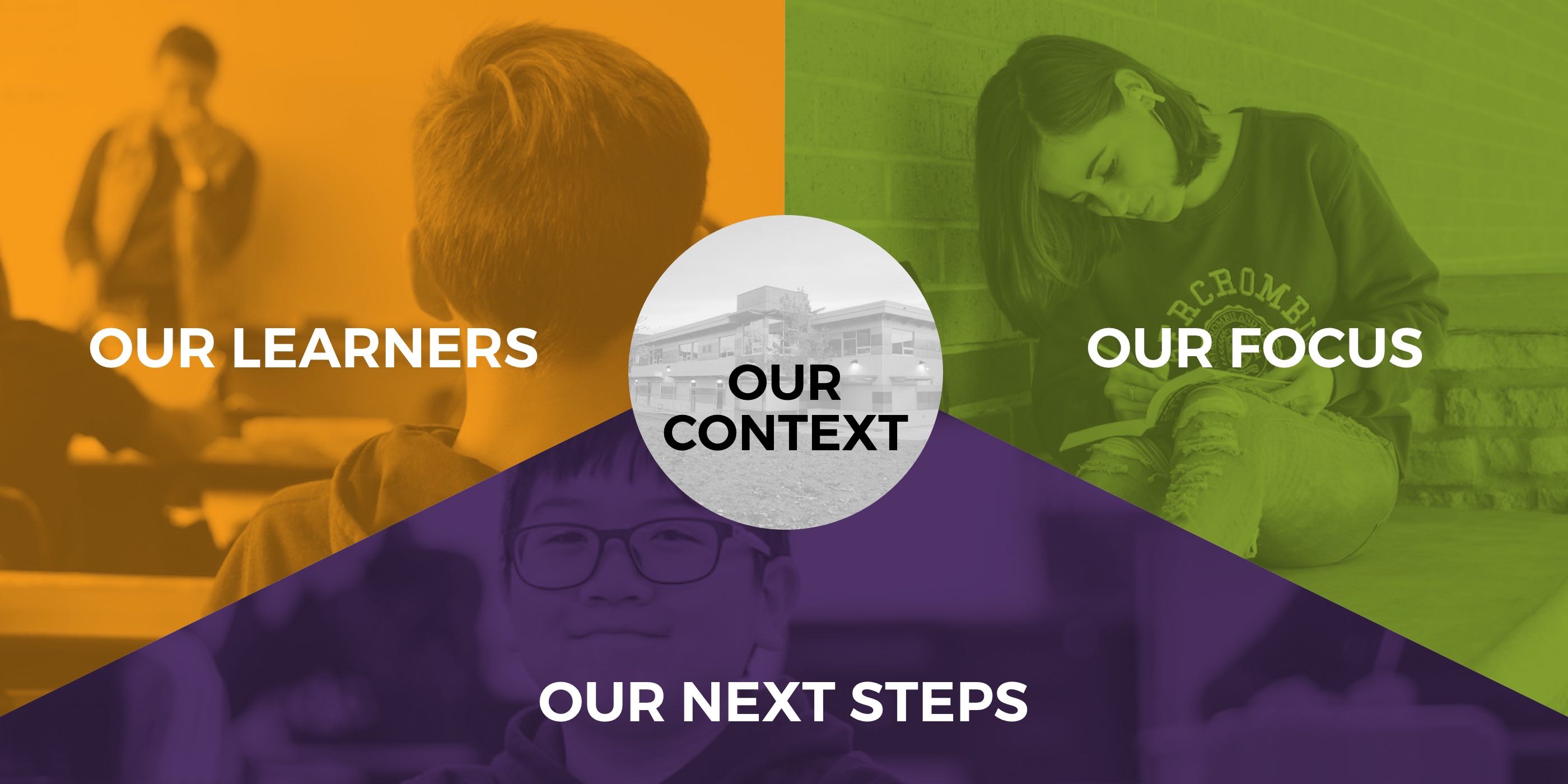

OUR CONTEXT
OUR LEARNERS
Social and Emotional Learning (SEL) is the process that supports adults, youth, and children in developing skills that are necessary for school, work, and life. This includes self-awareness, self-management, responsible decision-making, relationships skills, and social awareness. These skills are embedded in all subject areas in BC's curriculum. Below, we celebrate our learners' successes and strengths in the areas of:
- Social Awareness: the abilities to understand the perspective of and empathize with others, including those from diverse backgrounds, cultures, and contexts.
- Responsible Decision-Making: the abilities to make caring choices about personal behaviour and social interactions across diverse situations.
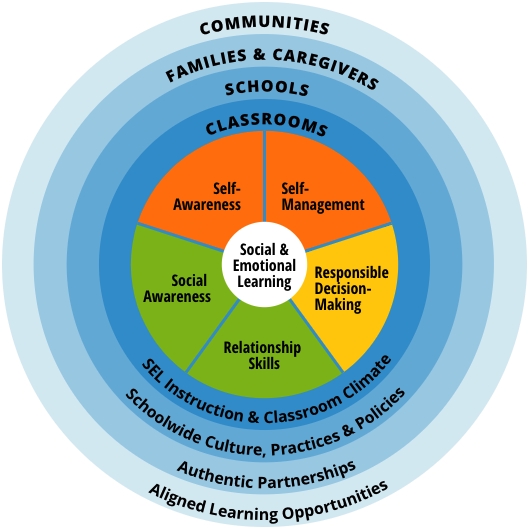
Responsible Decision-Making
Our learners demonstrate an understanding of the impact of one’s actions to self, others, and the world.
In this Science and SEL example, our learners are learning the impact of water conservation. They are exploring how water is important to them, their community, and other communities around the word. Our primary students built biomes to learn about the water cycle and how it is important to continue the cycle of life around us.
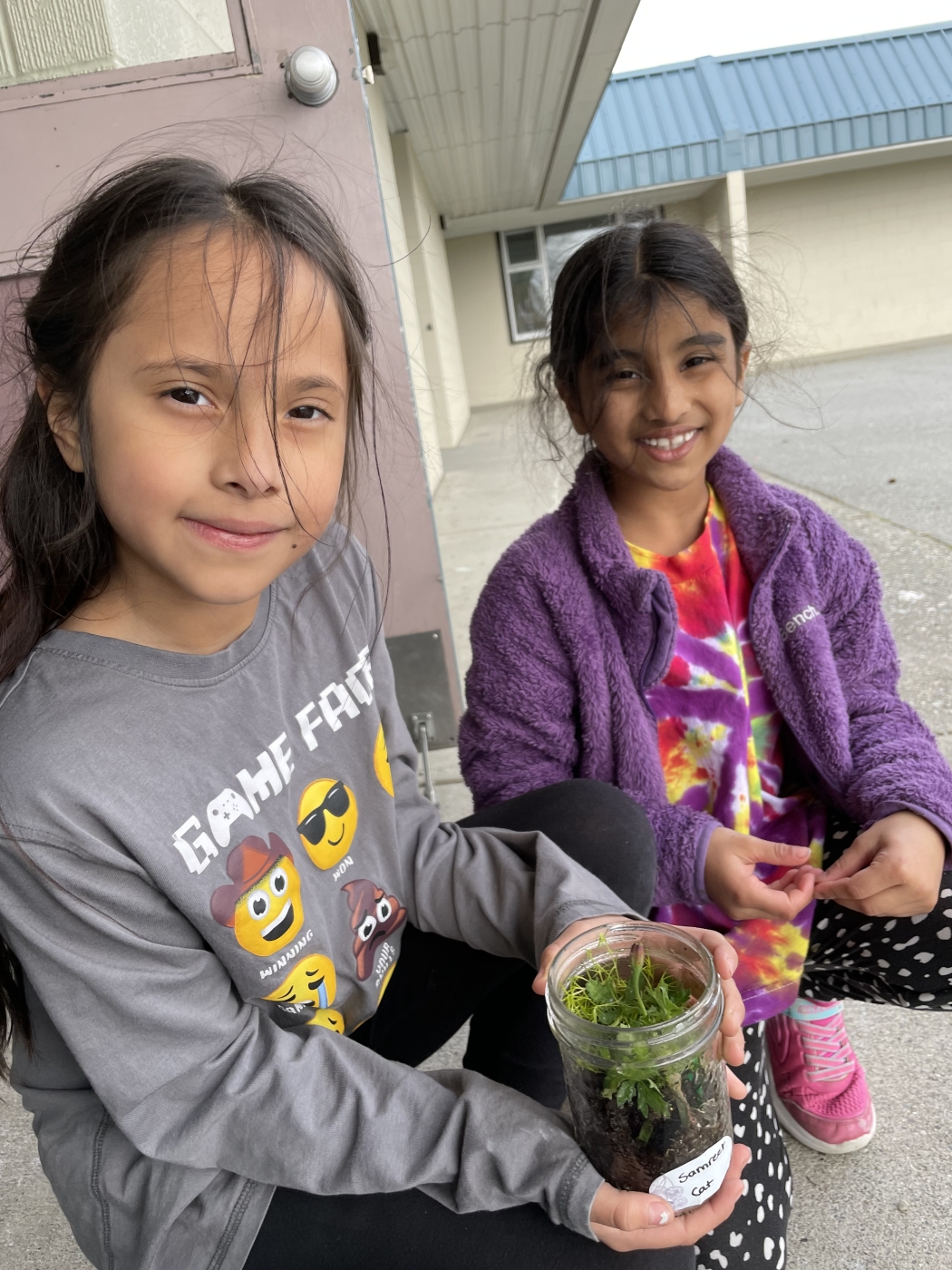
Afterwards, they explored how water can be found around them and how they use it. Our learners then explored how other communities rely on water and their process on how to gain and use safe water for drinking and cooking. Two of the stories that inspired this learning was “Water Walks” and “The Water Princess”.
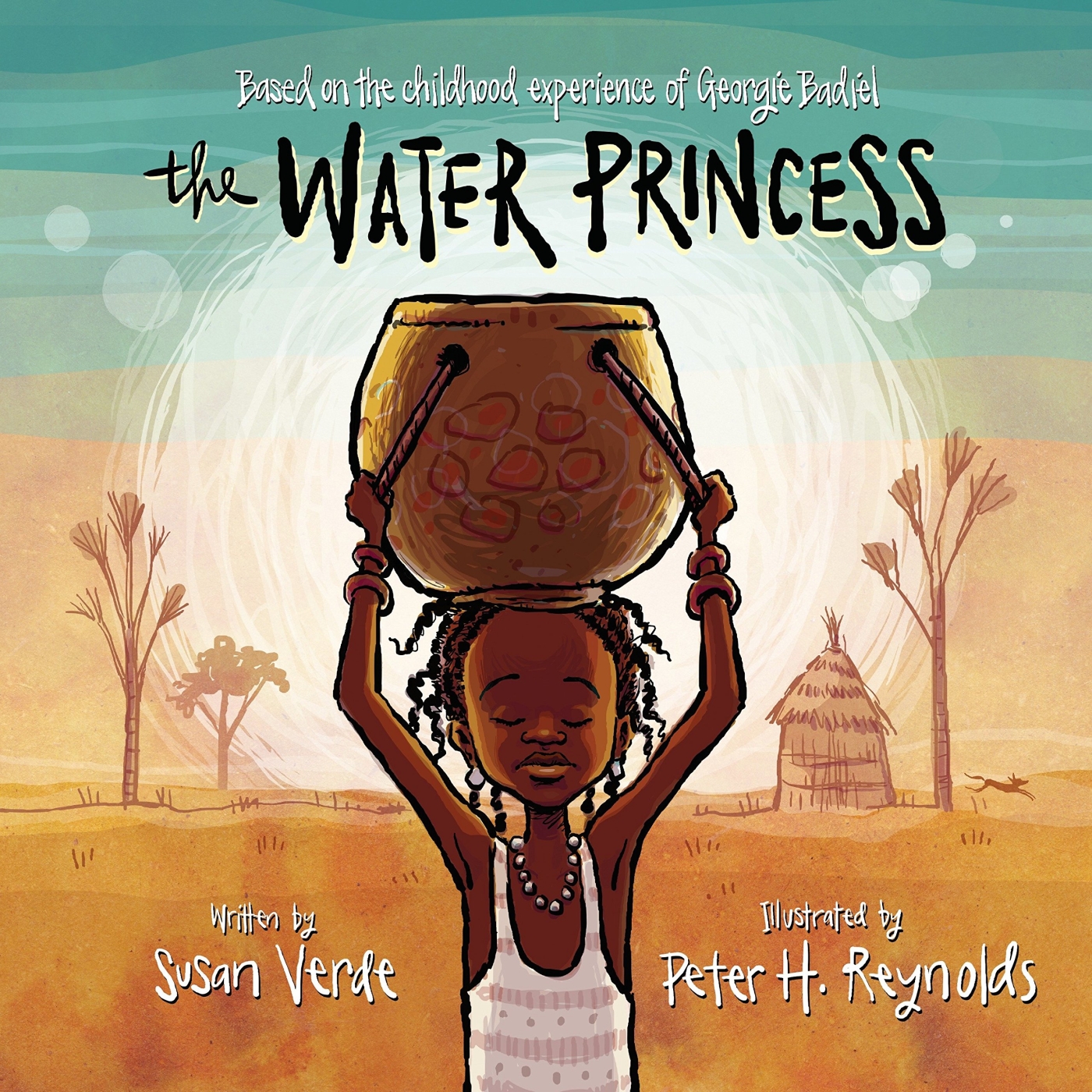 | 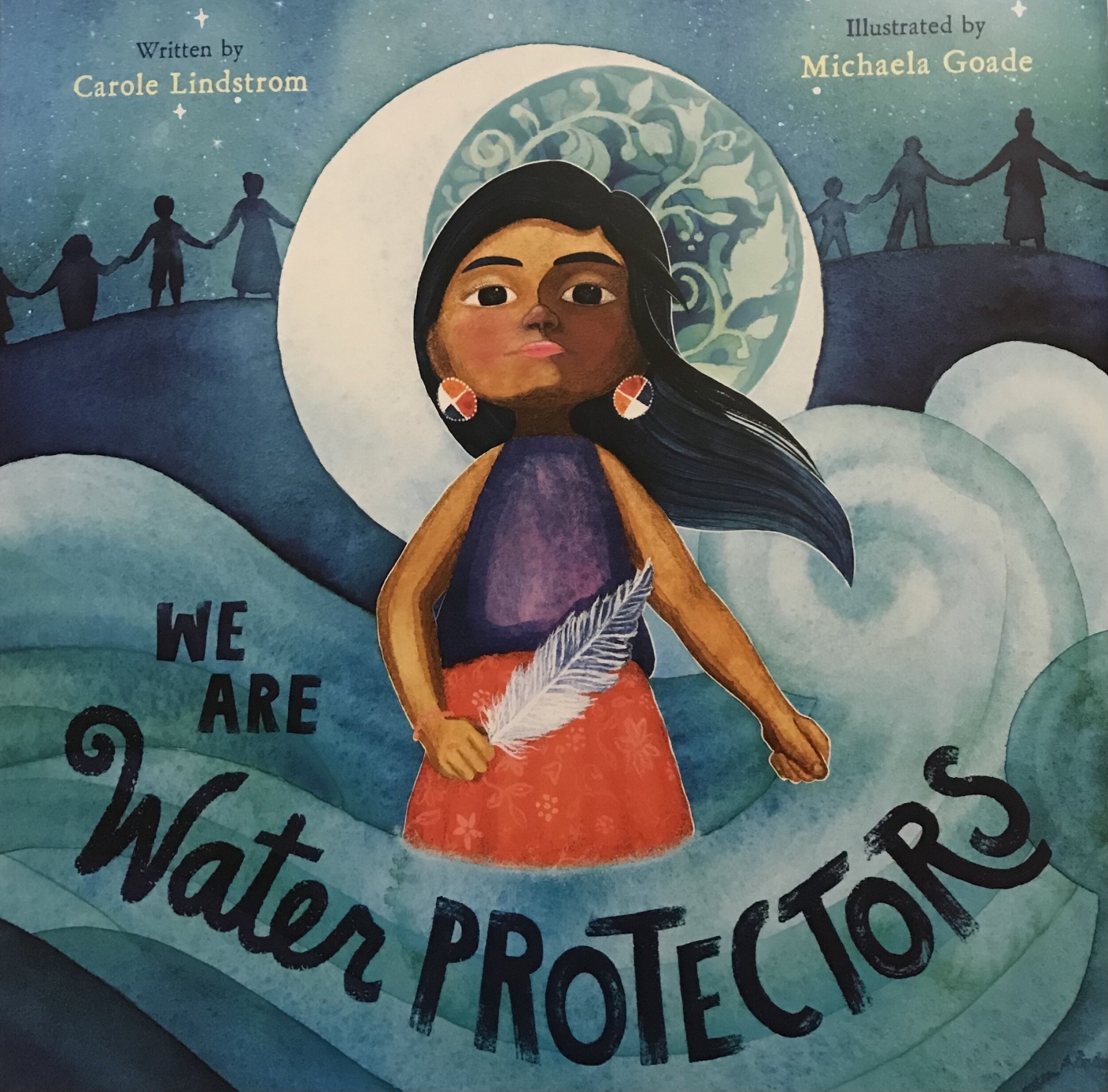 |
Our learners participated in a discussion regarding how water is imperative to the Indigenous communities since the had relayed on water for transportation, food (the salmon) and how we can make good choices to help preserve and take care of the water around us. Our learners also engaged in a written reflection on how they can be respectful and kind to water. “Water Protectors” was another story that supported this discussion and reflection.
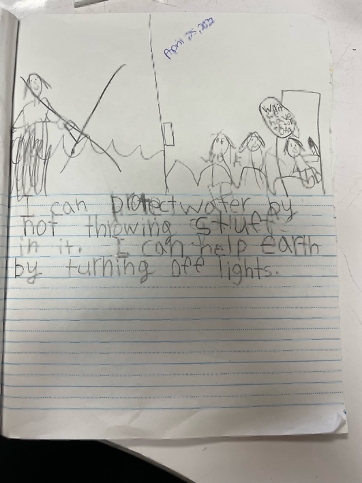 |  |  |
"I can protect water by not throwing stuff in it. I can help Earth by turning off lights."
Our learners continued to share their understanding by engaging in a Water Walk to spread the word about water conservation. Our learners also explored the similarities and differences between their own lives and water access to other communities around the world that do not have easy access to water.
Social Awareness
Our learners can appreciate the importance of respect, inclusivity, and other positive behaviours in diverse learning environments.
In this Career Education and SEL example, an upper intermediate class has been working on developing a capacity to demonstrate respect towards one another as well as gaining an appreciation for inclusive practices in our classroom. Functioning as a small microcosm of society, this classroom has adopted a “Social Emotional Charter” which governs expectations for how students and teachers interact with one another. The class all participated in the creation of this document and refer to it often throughout the year when situations arise which require a refocus on respectful and inclusive interactions.
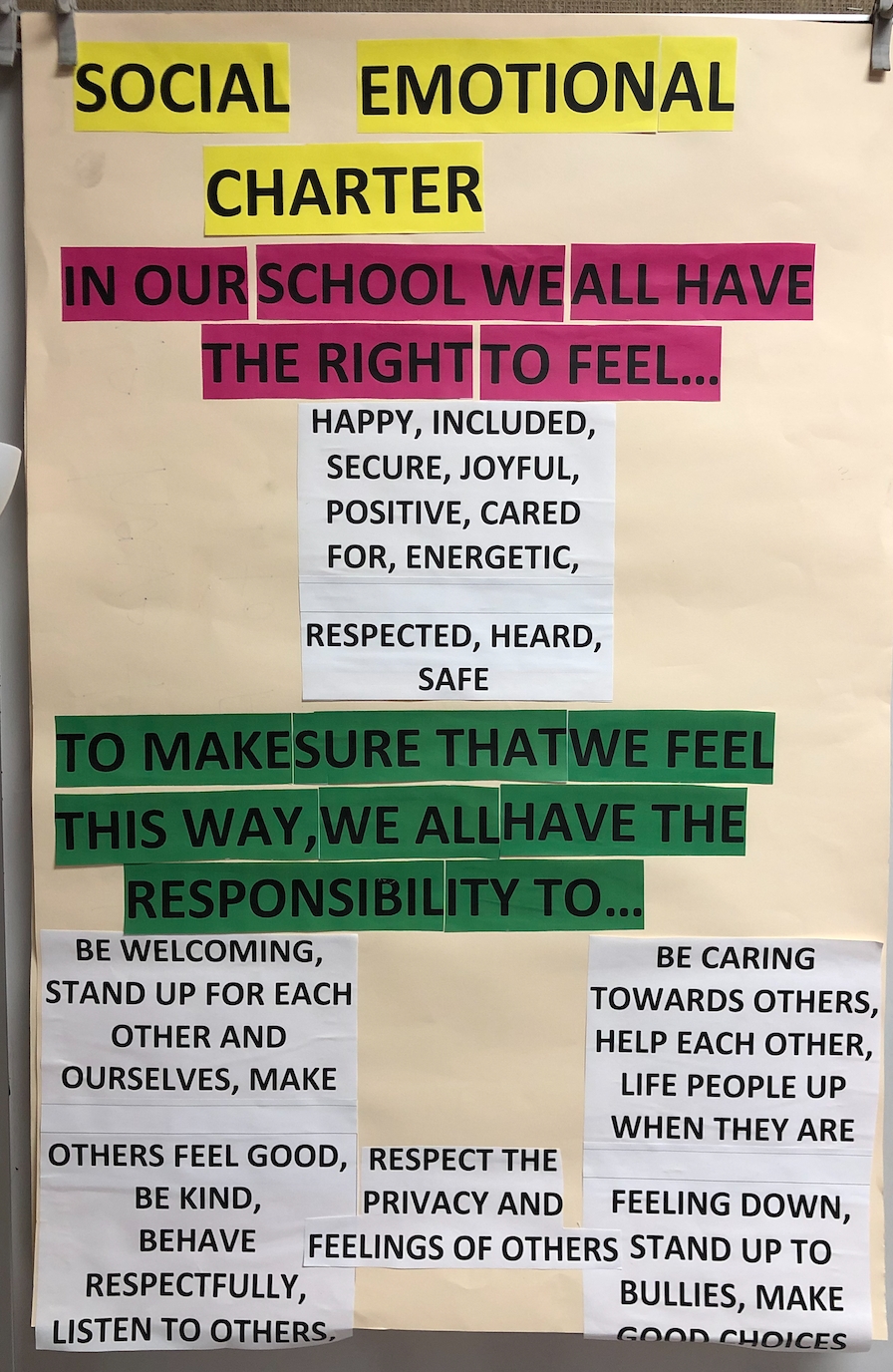 | 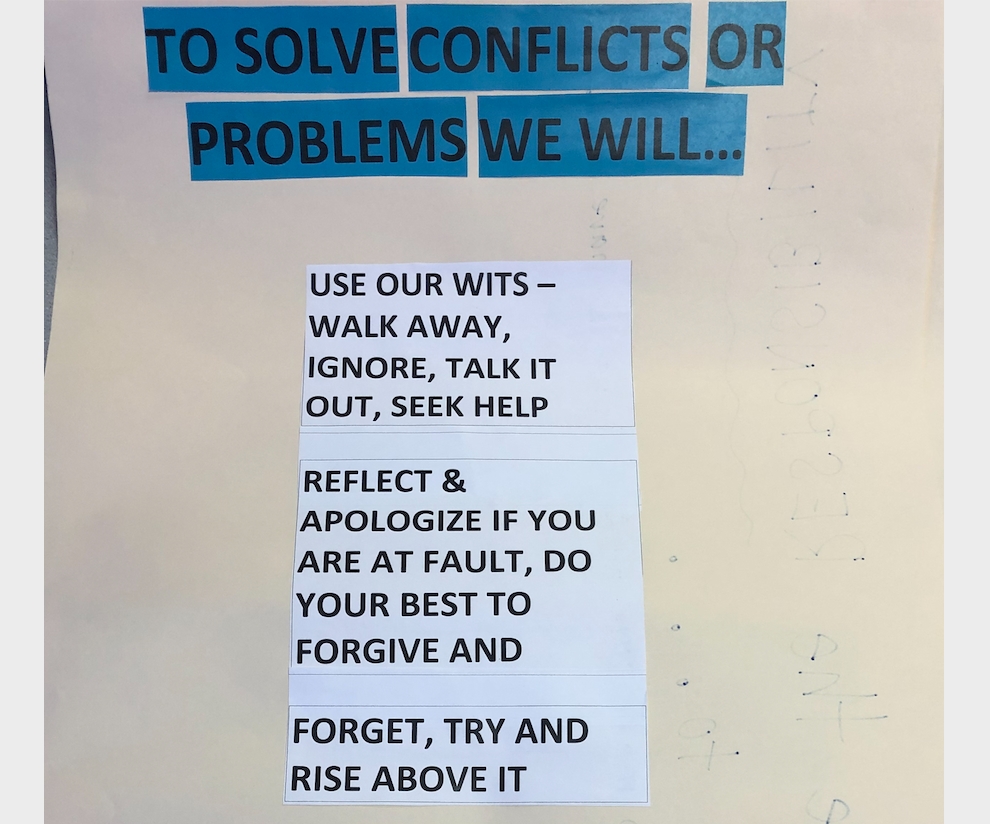 |
To reinforce the ideas raised in the Social Emotional Charter, the class has participated in purposeful connection and relationship building activities throughout the year. Below is an example one of these activities. It is called ‘unplugged’ twitter feeds, where students pin their own ‘tweet’ in response to a prompt given in class. The example below had the prompt, “What is a dream that you have for your future?” Students crafted their ‘tweets’ and circulated around the room “tweeting” responses to their classmates. This activity has been a wonderful opportunity to facilitate respectful exchanges, include all students and forge connections among those who do not regularly interact.
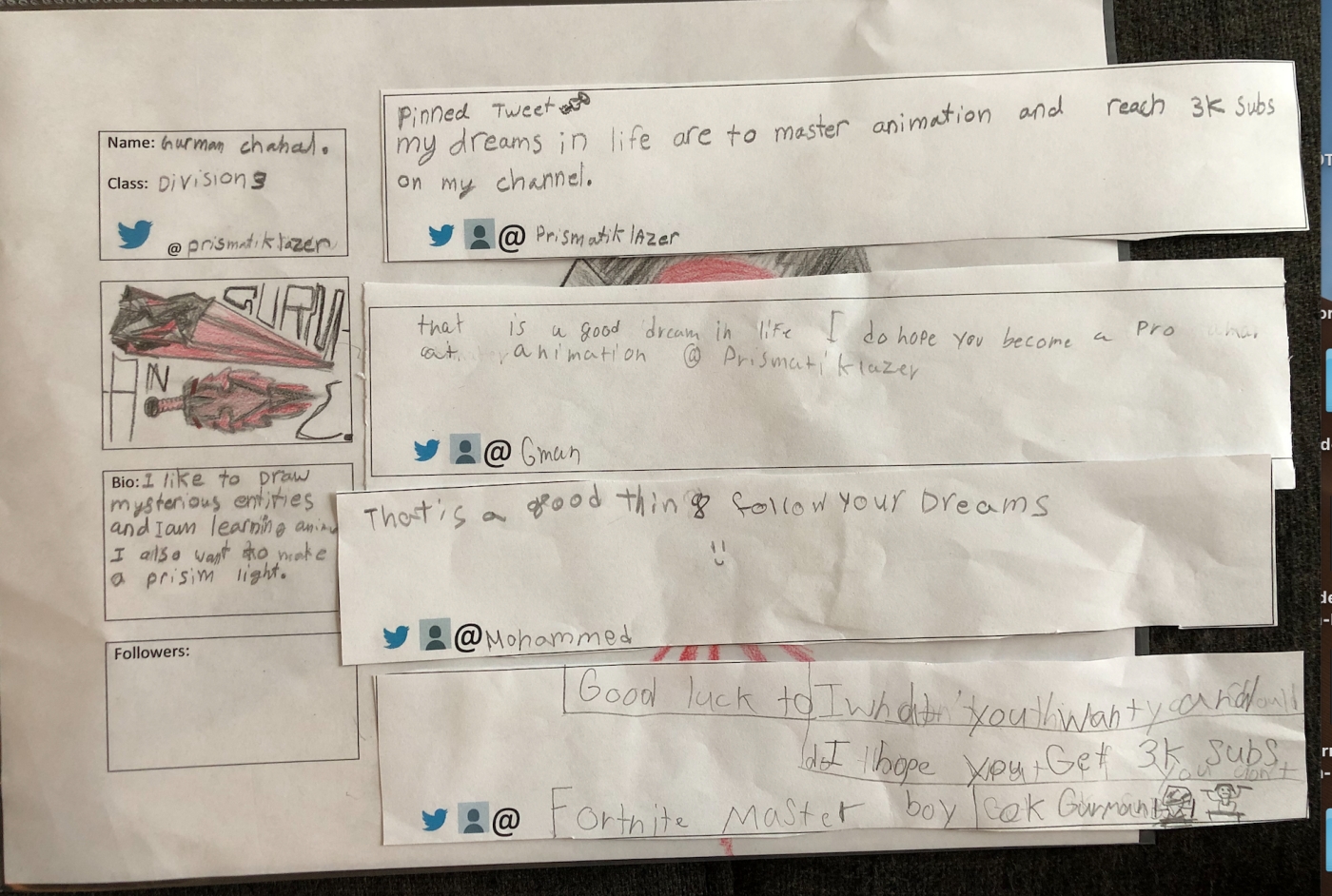 |
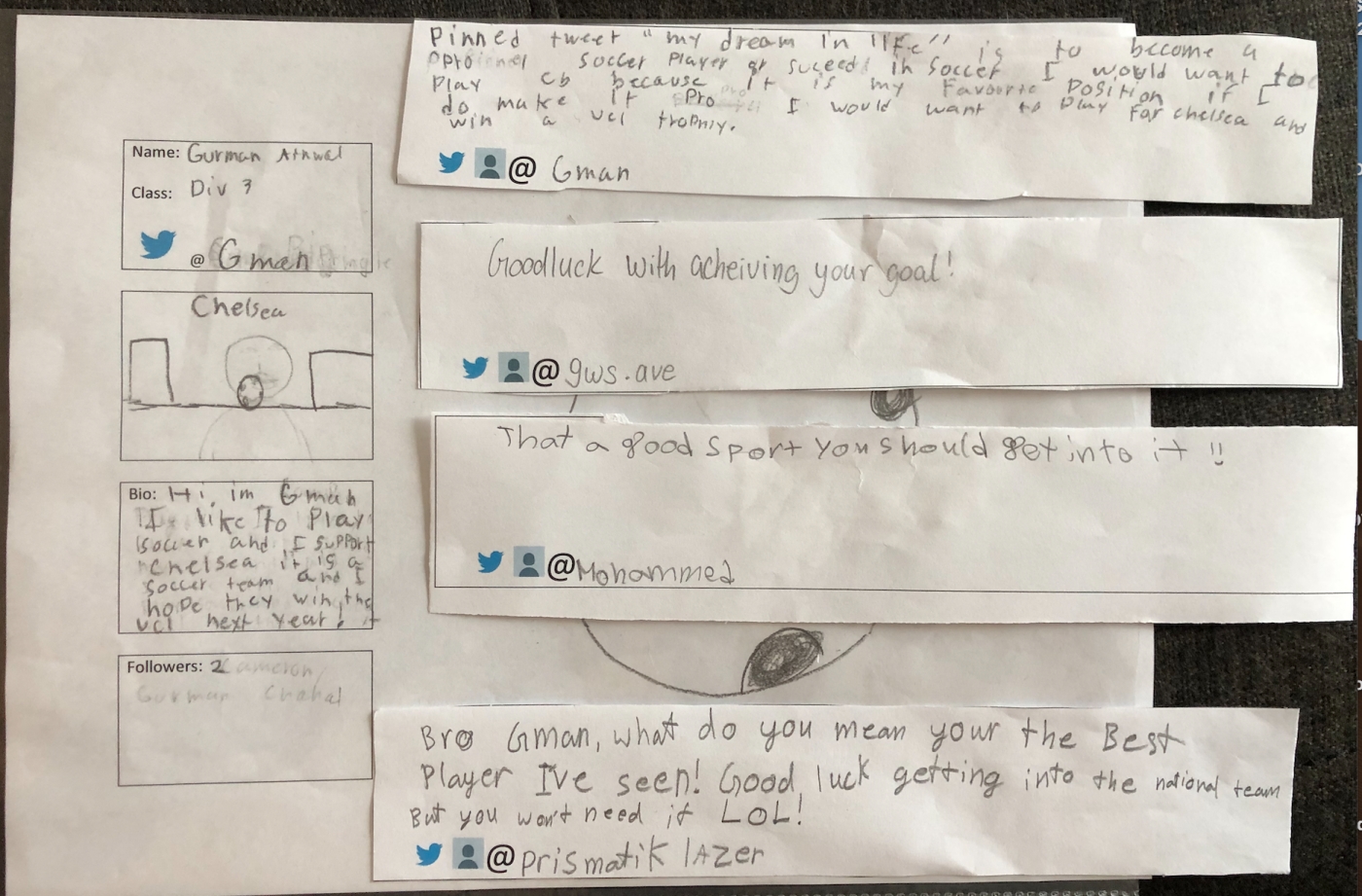 |
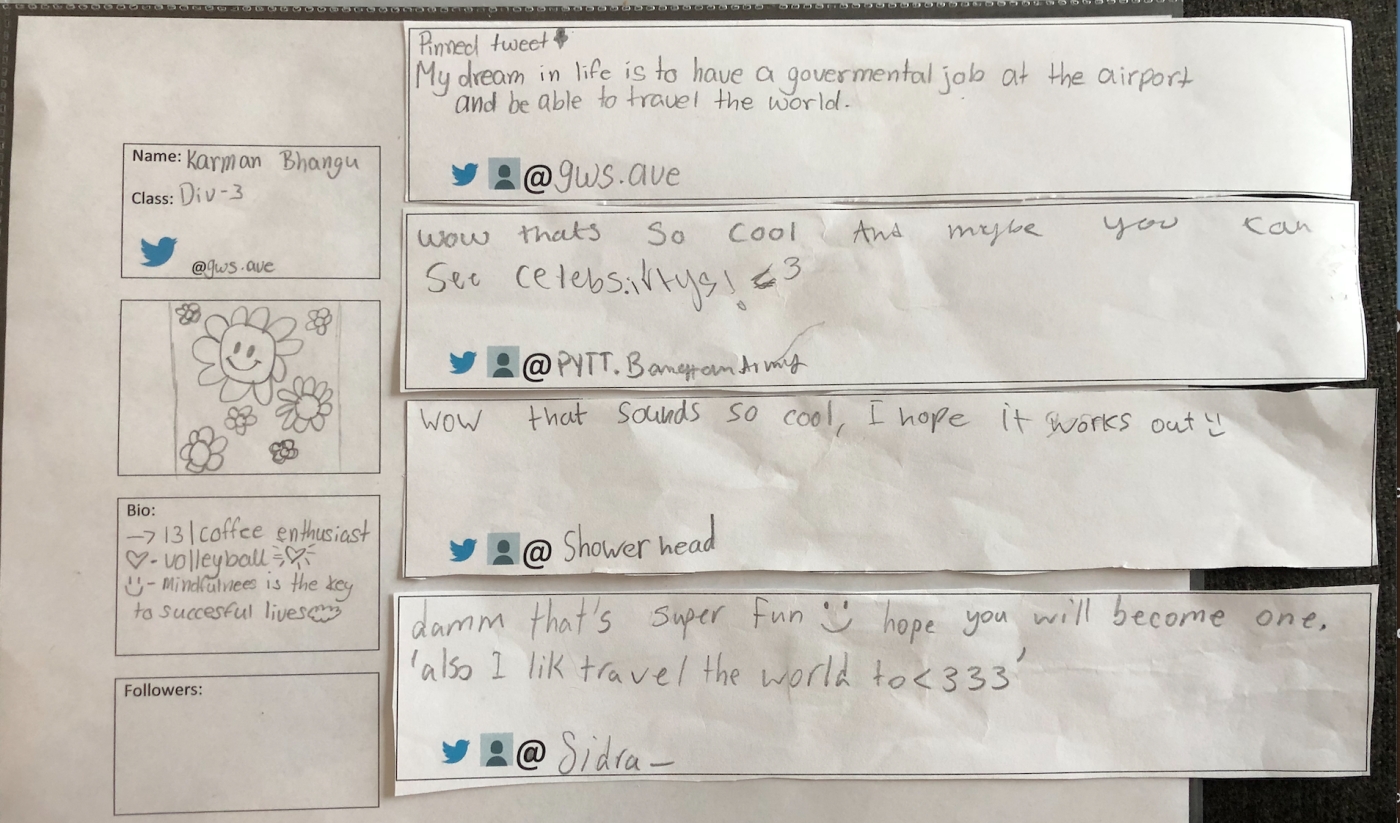 |
Our learners are able to question self and others about the reciprocal relationship between self and community.
In this Career Education and SEL example, an upper intermediate class is working at understanding the concept of community through ‘Talking Circles,’ a practice based on Indigenous Pedagogy. Below is a photo of a circle that was dedicated to sharing our learning from a presentation on Residential Schools during First Peoples in Residence Week at our school.
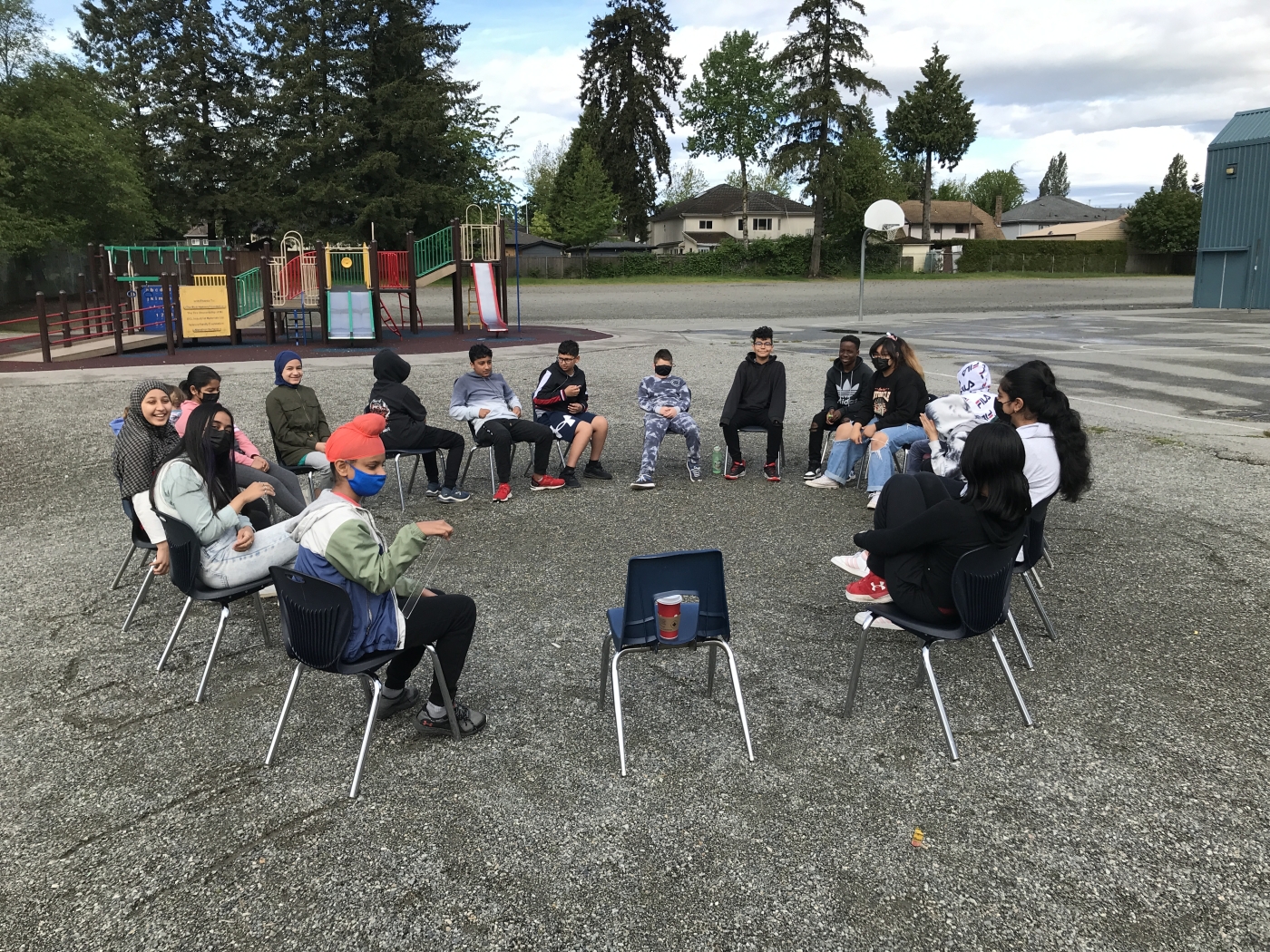
This class is learning about their roles in our class, school, community and world at large with respect to Reconciliation efforts. They are learning what it means to be an ally to Indigenous Peoples in Canada and how that starts in our communities by sharing their learning about the dark chapters of our country’s history with others. We wrote letters to the survivors of Residential Schools to thank them for sharing their stories with us and affirmed our commitment to Reconciliation. Below is an example followed by a couple of quotes from other letters written.
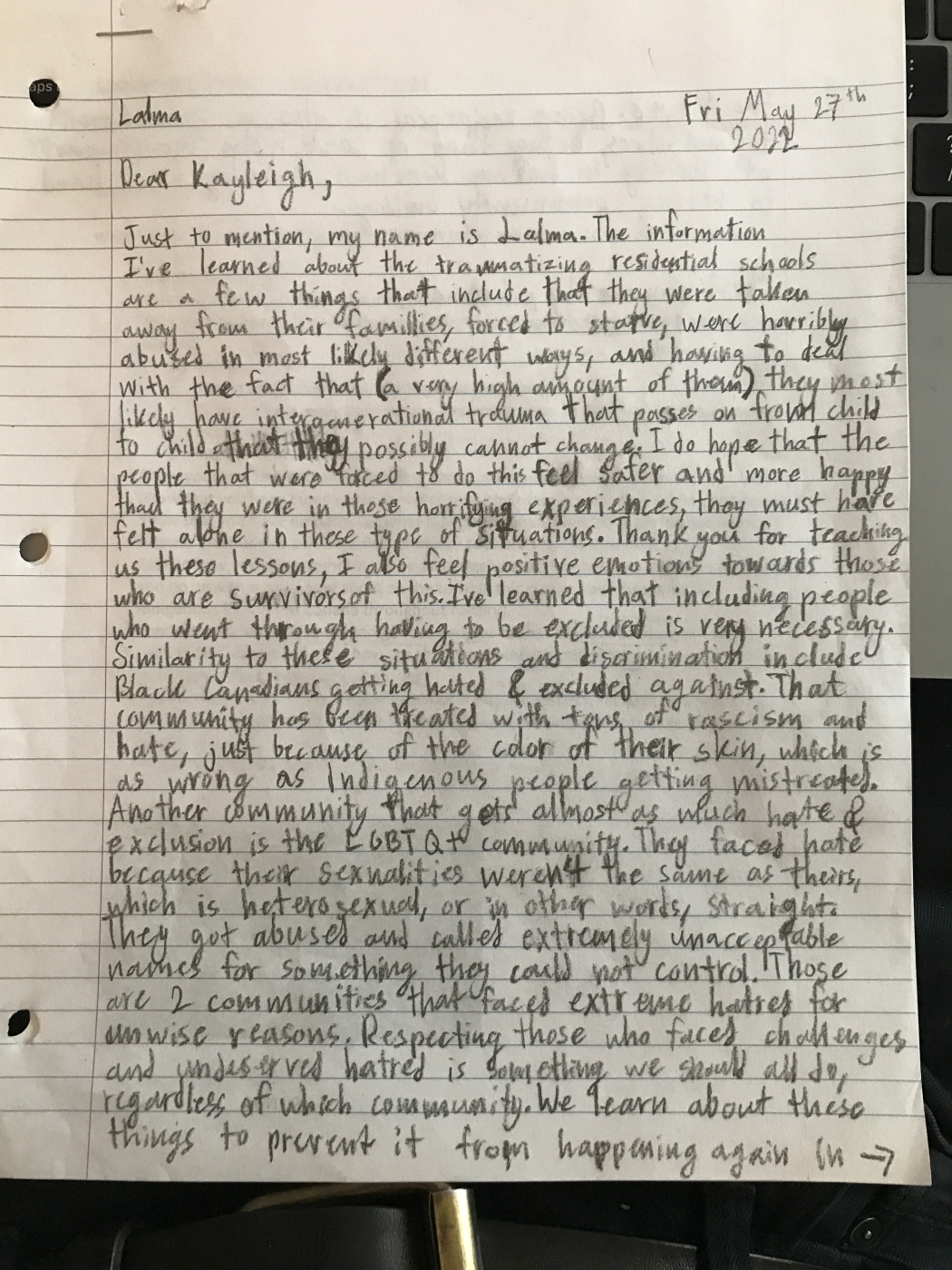 | 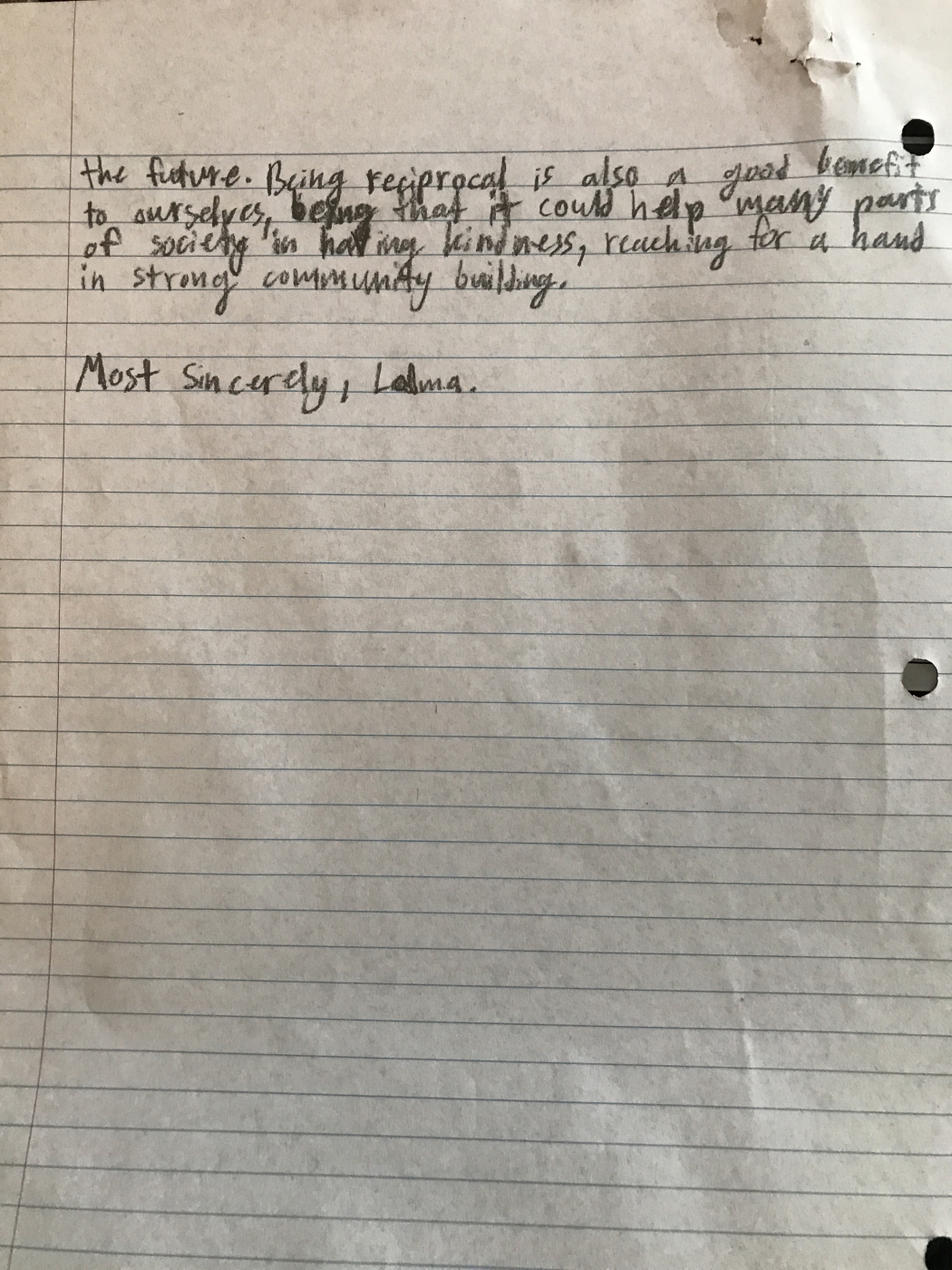 |
Indigenous families have been discriminated for a very long time. I can understand what they have gone through. When I was 5 years old our family had to flee the country because of war, leaving all our relatives behind. I am proud of all the people who share their stories even though it is hard to talk about. Indigenous people, Sikh & Black Canadians, LGBTQ+ people have all suffered from similar trauma such as discrimination, stereotyping, racism and having to fight for their rights. It is important that we learn about these things so history doesn't repeat itself. We all have a role to play. If you rely on others to do it, nothing will change.
But what do we do with this knowledge? Well, knowledge is power and this knowledge has the power to heal mental injuries to the First Nations of Canada. We can spread this knowledge around our community to heal relationships and trust with the ancestors of our land. We can tell others to share this knowledge with their family and friends. Together, we can stop this from existing ever again.
OUR FOCUS
Every day, our learners are presented with opportunities to practice and demonstrate their Social and Emotional Learning skills and capabilities. Our team of educators provide our learners with these essential skills to set them up for success in today's rapidly changing world. To identify students’ overall strengths and areas for growth, we tracked Responsible Decision-Making & Social Awareness in three cohorts of learners across subject areas and grade levels. These cohorts include a diverse range of learners that are representative of our school’s population.
The SEL competency we focused on in relation to “responsible decision-making”;
- Developing an understanding of the role of personal decision making in promoting community/environmental wellbeing.
Below are examples of our students’ classroom experiences as they relate to responsible decision making.
Developing an understanding of the role of personal decision making in promoting community/environmental wellbeing.
Students across all grades in our school are looking for solutions to the big questions that permeate our world today. Of particular interest to them are evaluating the consequences of our actions today on the health of our planet tomorrow. They are grappling with questions that extend to equitable access to clean drinking water, the granular impact of one’s actions on global issues like climate change and the ripple effect caused by the diminishing number of bees returning to pollinate.
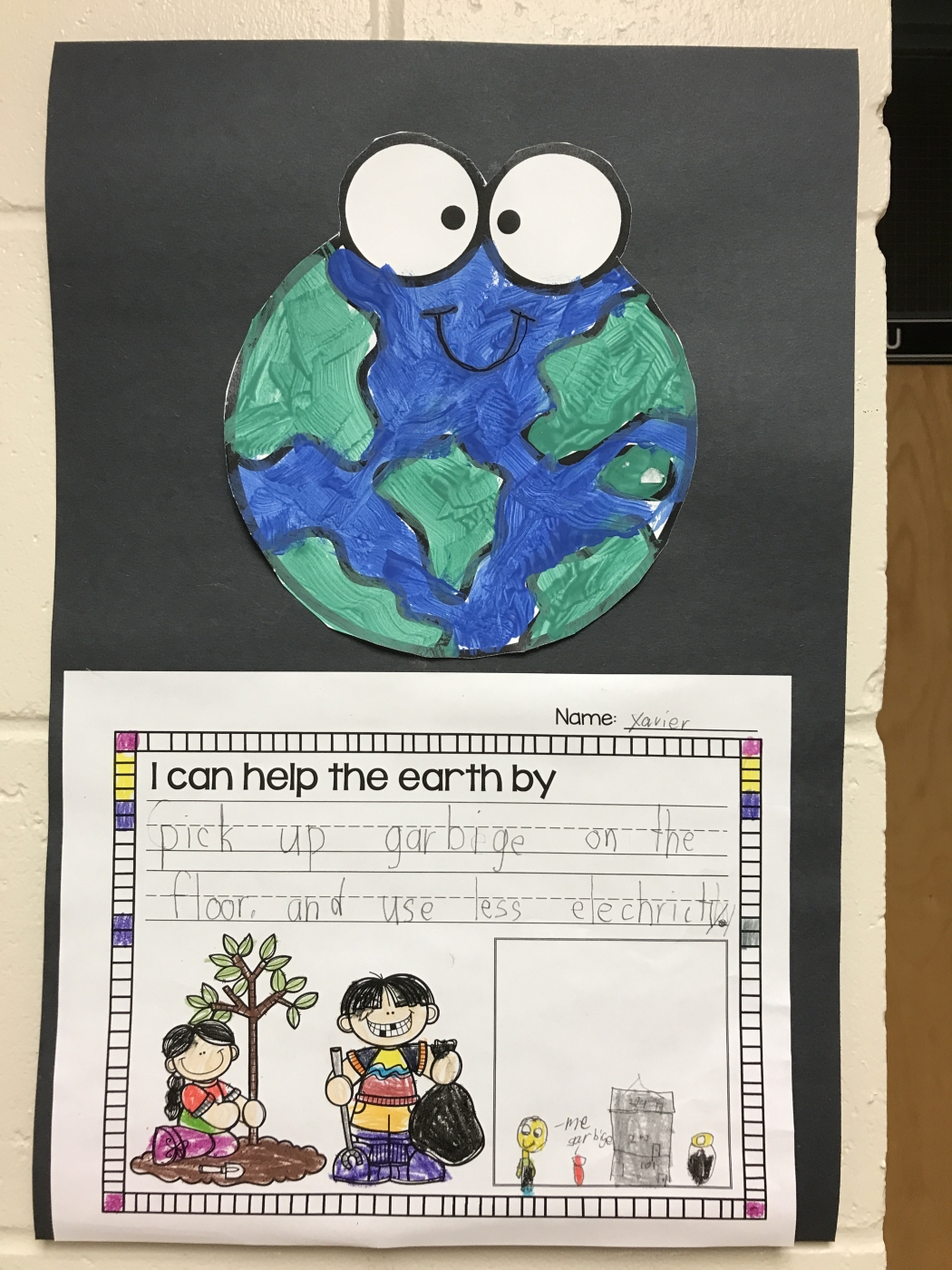 | 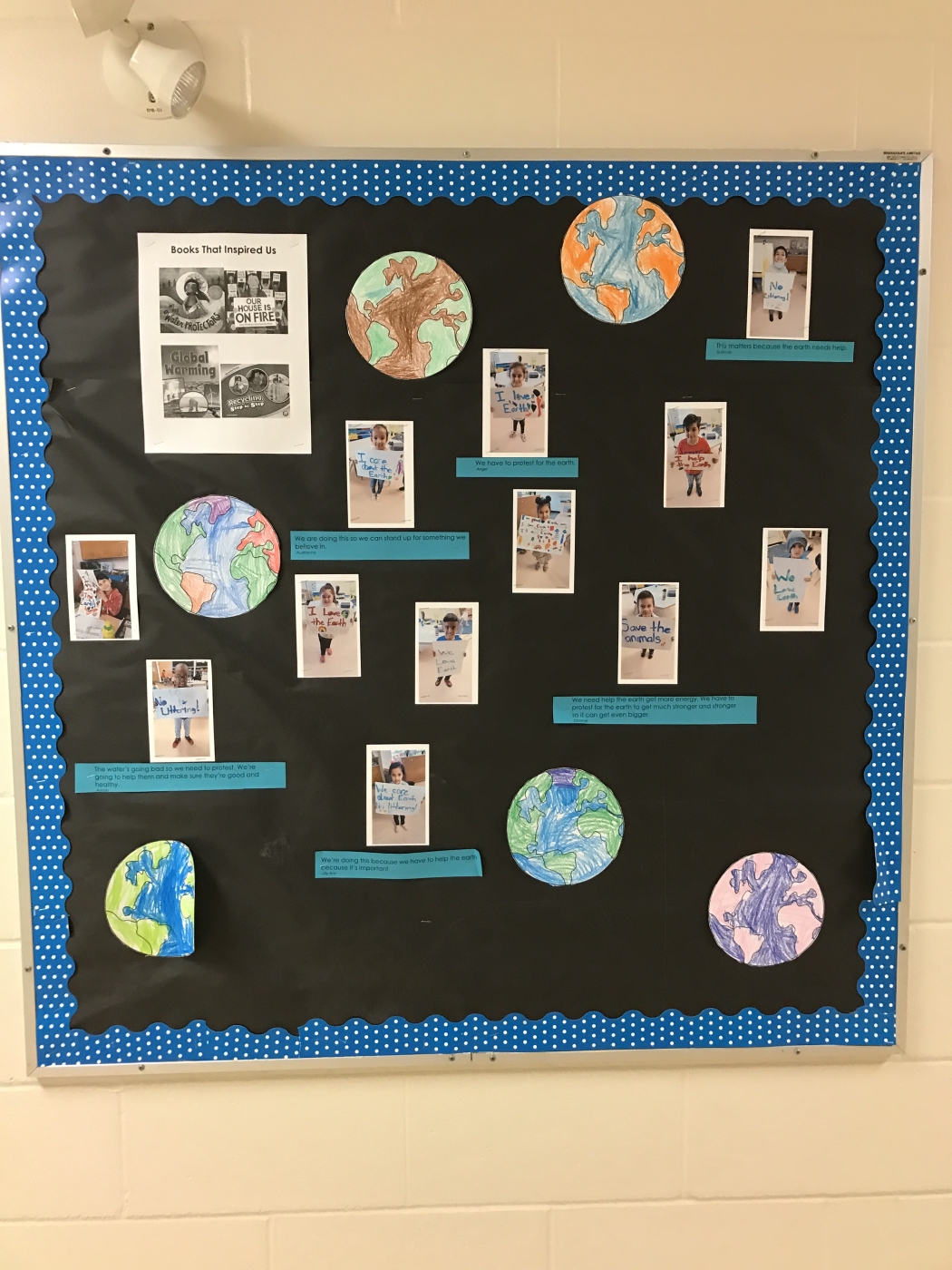 | 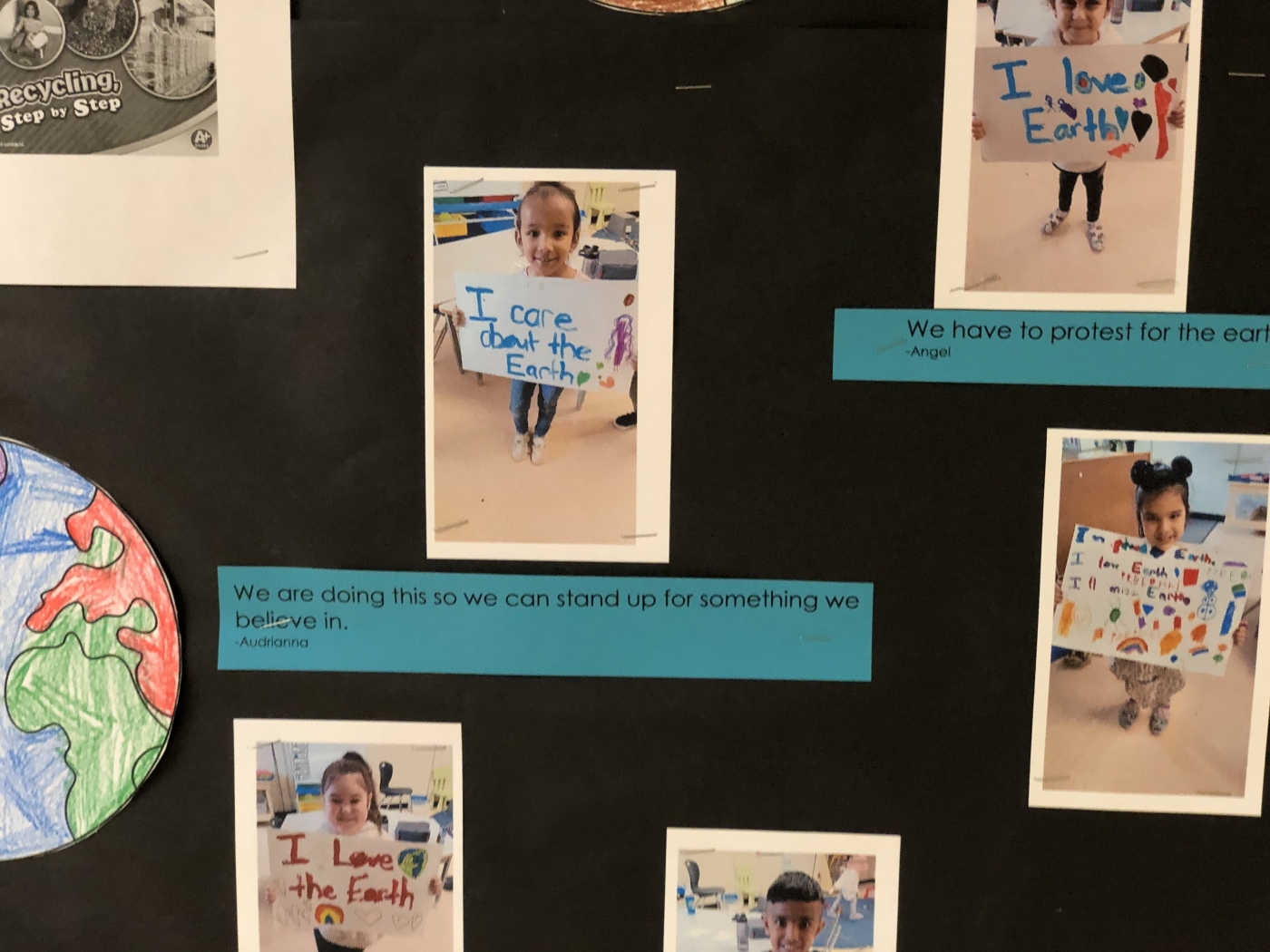 |
The SEL competencies we focused on in relation to “social awareness” include:
- Identifying diverse social norms, including unjust ones
- Taking others’ perspectives
Below are examples of our students’ classroom experiences as they relate to social awareness.
Identifying diverse social norms, including unjust ones
Our students embrace the diversity found within our school. We celebrate Kinvig’s many cultures during festivities like Multicultural Week and maintain that tradition throughout the school year. Our students also learn about the unjust experiences marginalized groups have endured throughout history during occasions like Black History Month, Sikh Heritage Month, Pride Month (LGBTQ+), Asian Heritage Month and Indigenous History Month to name a few.
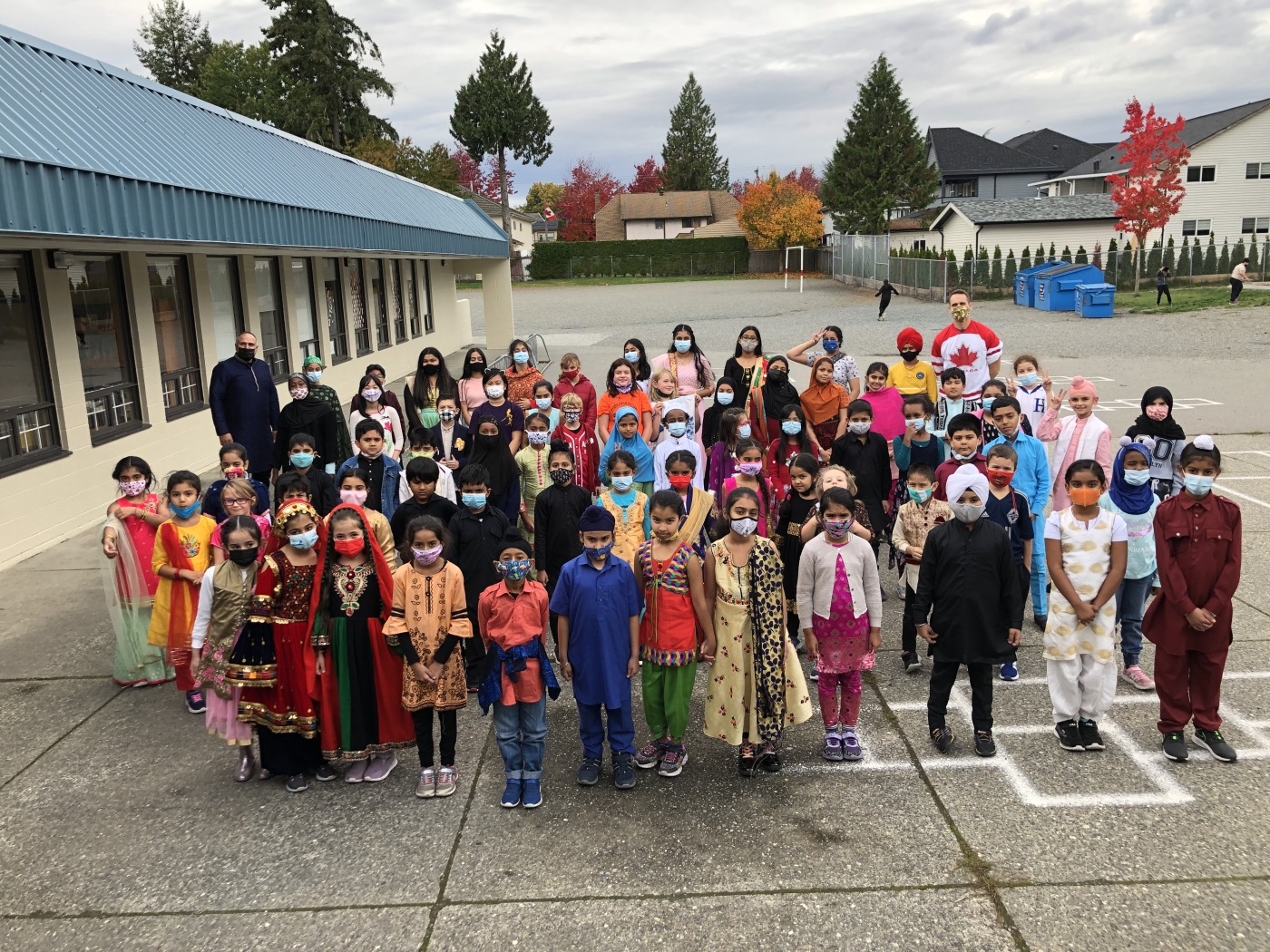
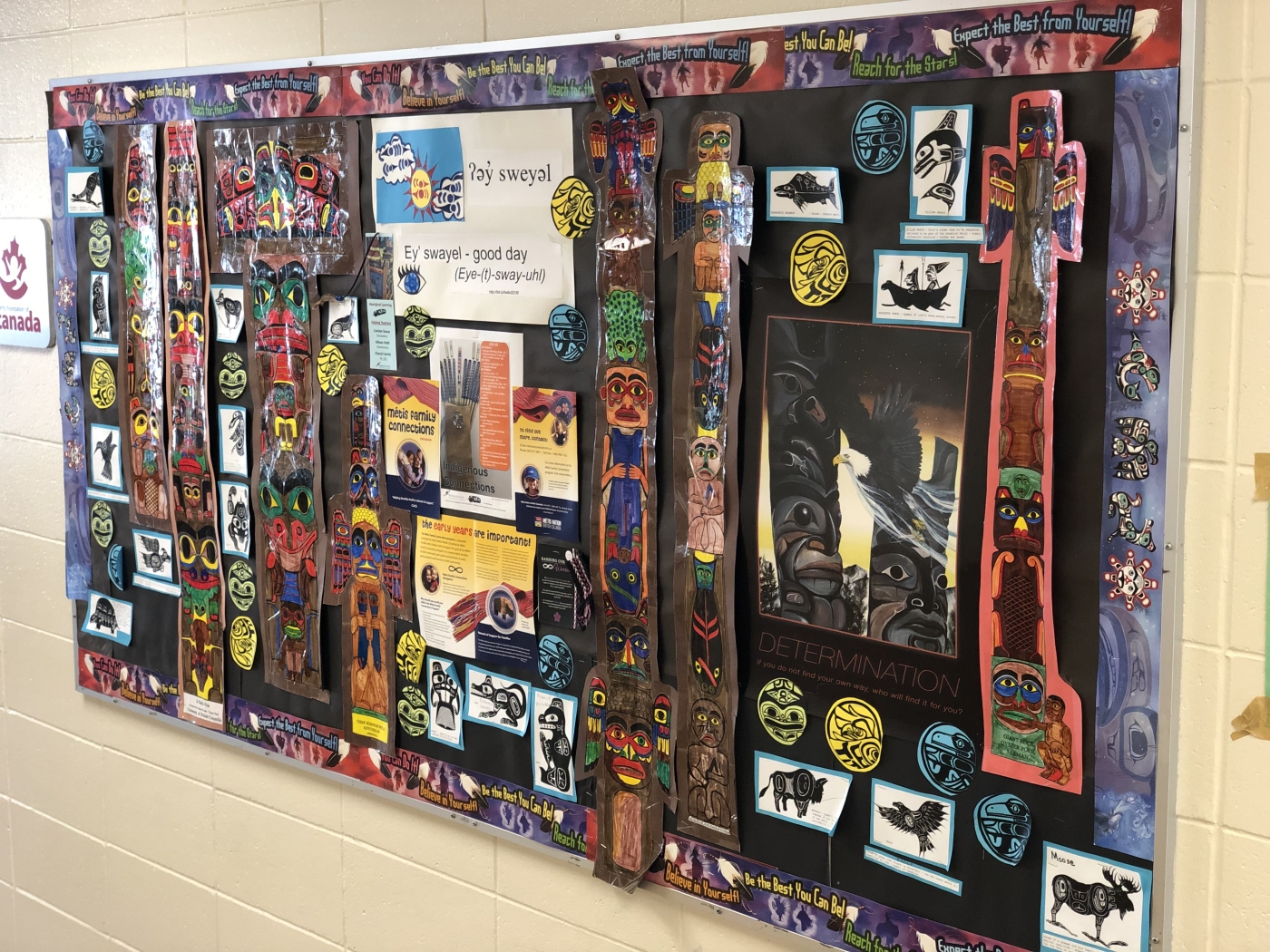 | 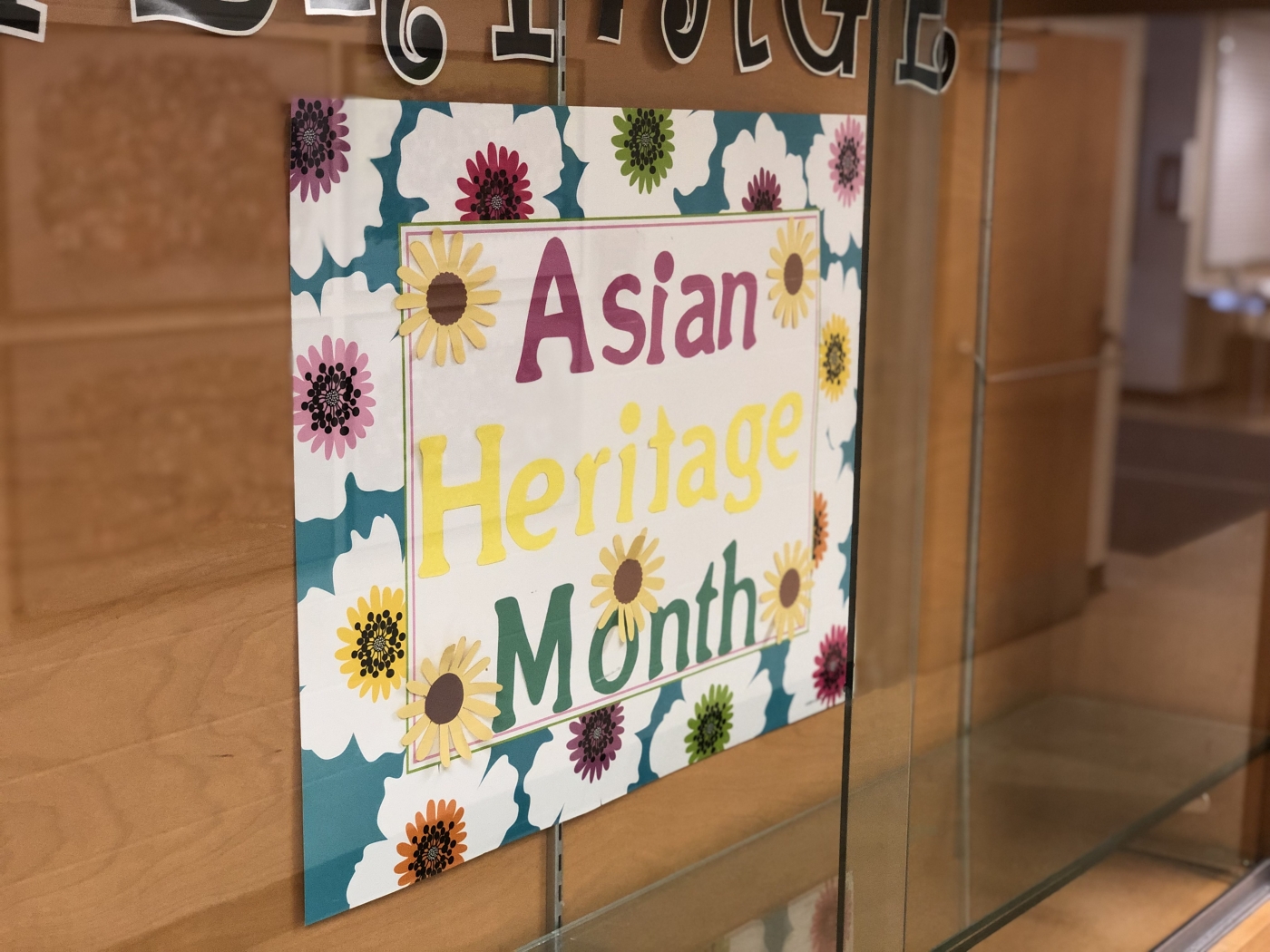 |
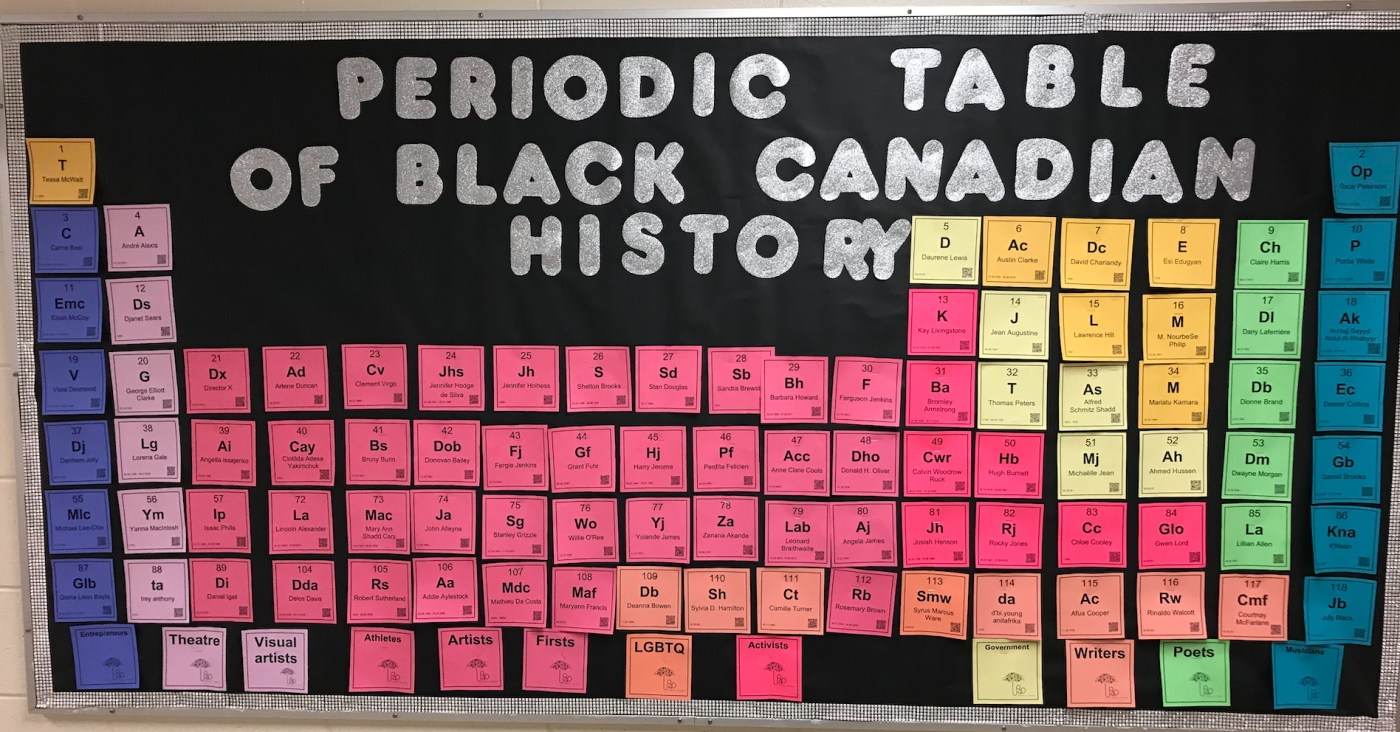 | 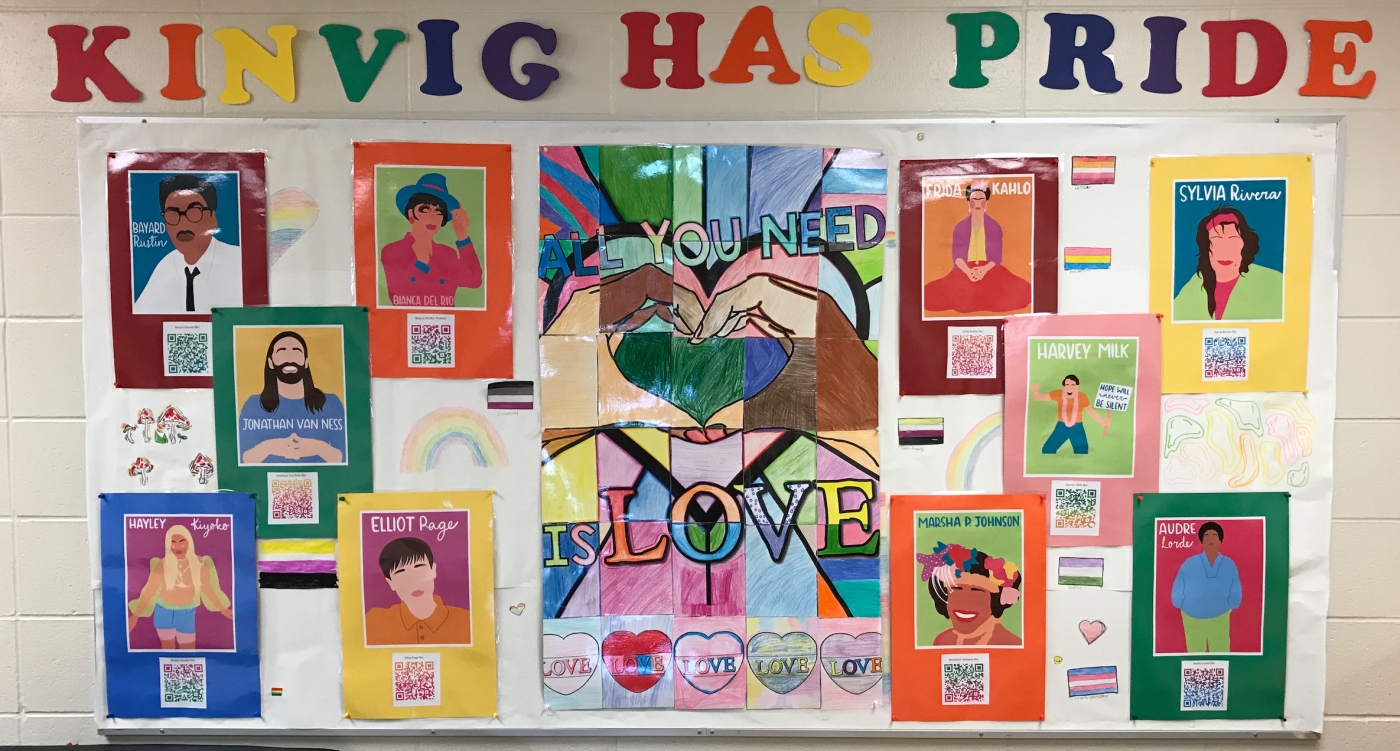 |
Taking others’ perspectives
All year, our intermediate students in our Leaders for Change team have been raising awareness to the plight of wildlife through their advocacy work for the North Island Wildlife Recovery Association (NIWRA). Throughout the year, they have spoken to the students at our school during morning announcements, classroom visits and assembly announcements about the challenges that many of our wildlife face. Learning about the challenges facing many animals in nature offers an accessible gateway for our students to develop traits like empathy and taking on the perspective of others.
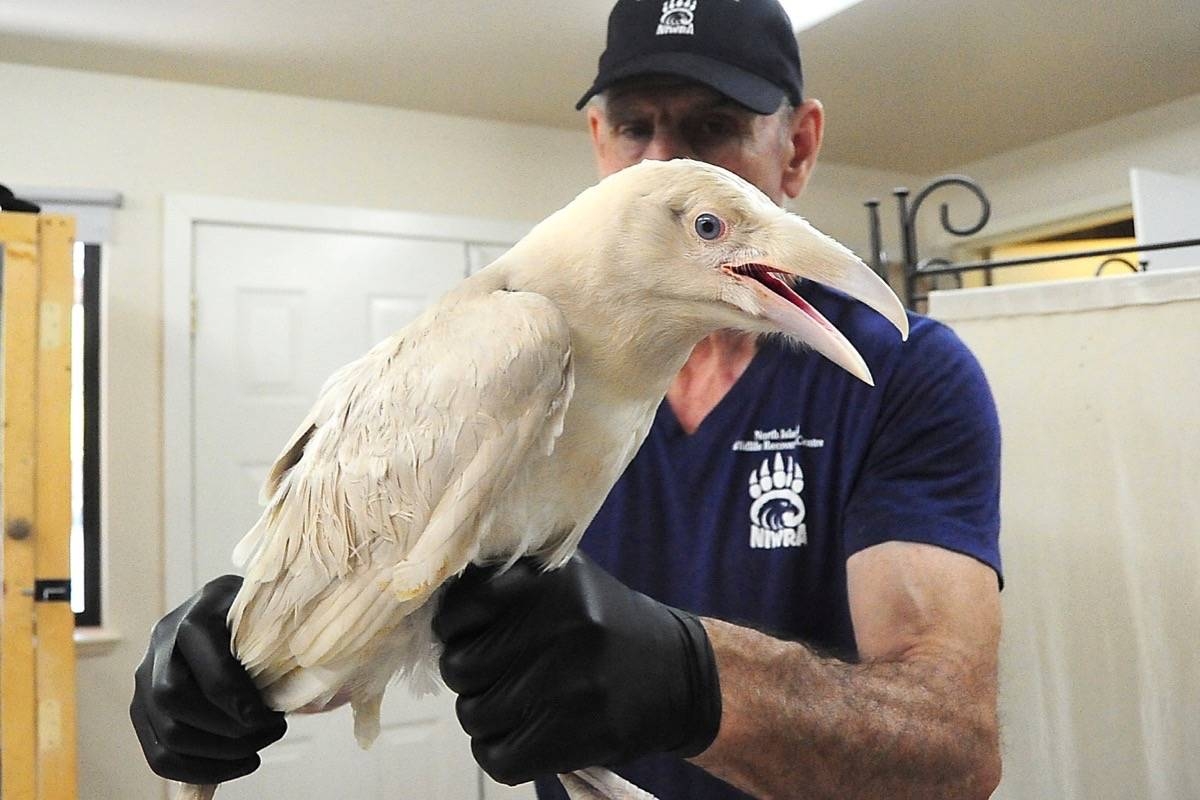 | 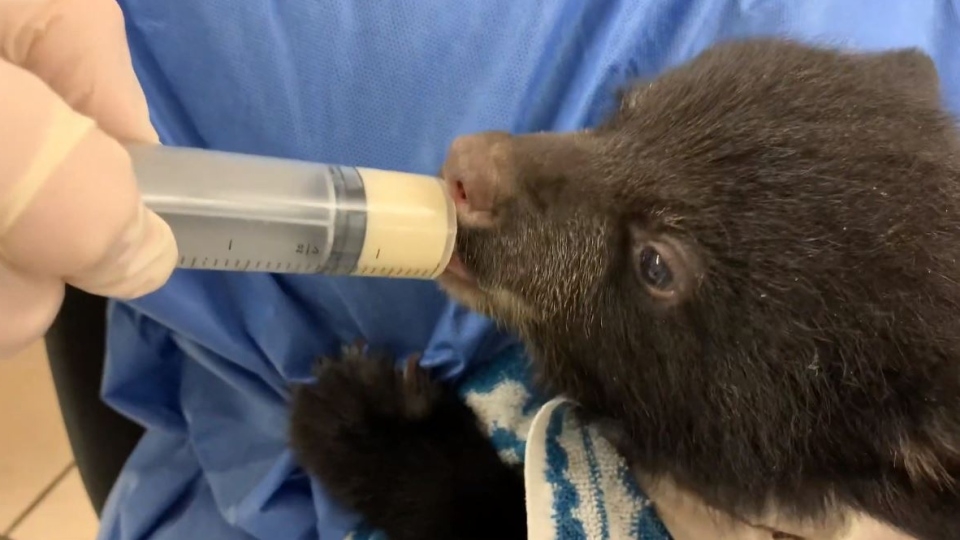 | 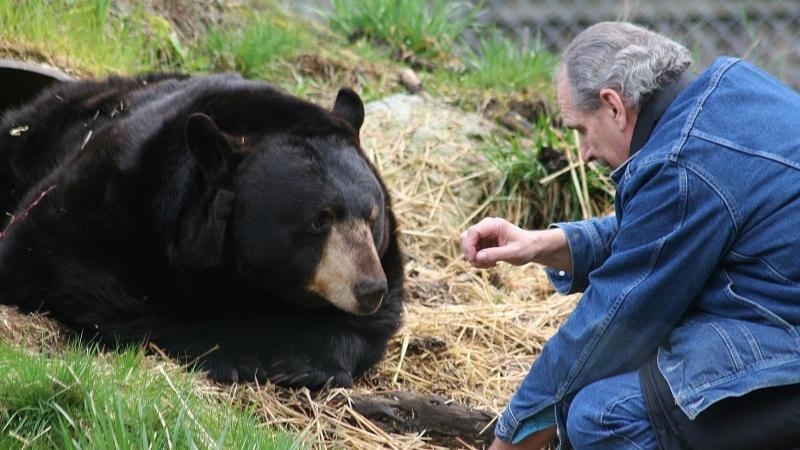 |
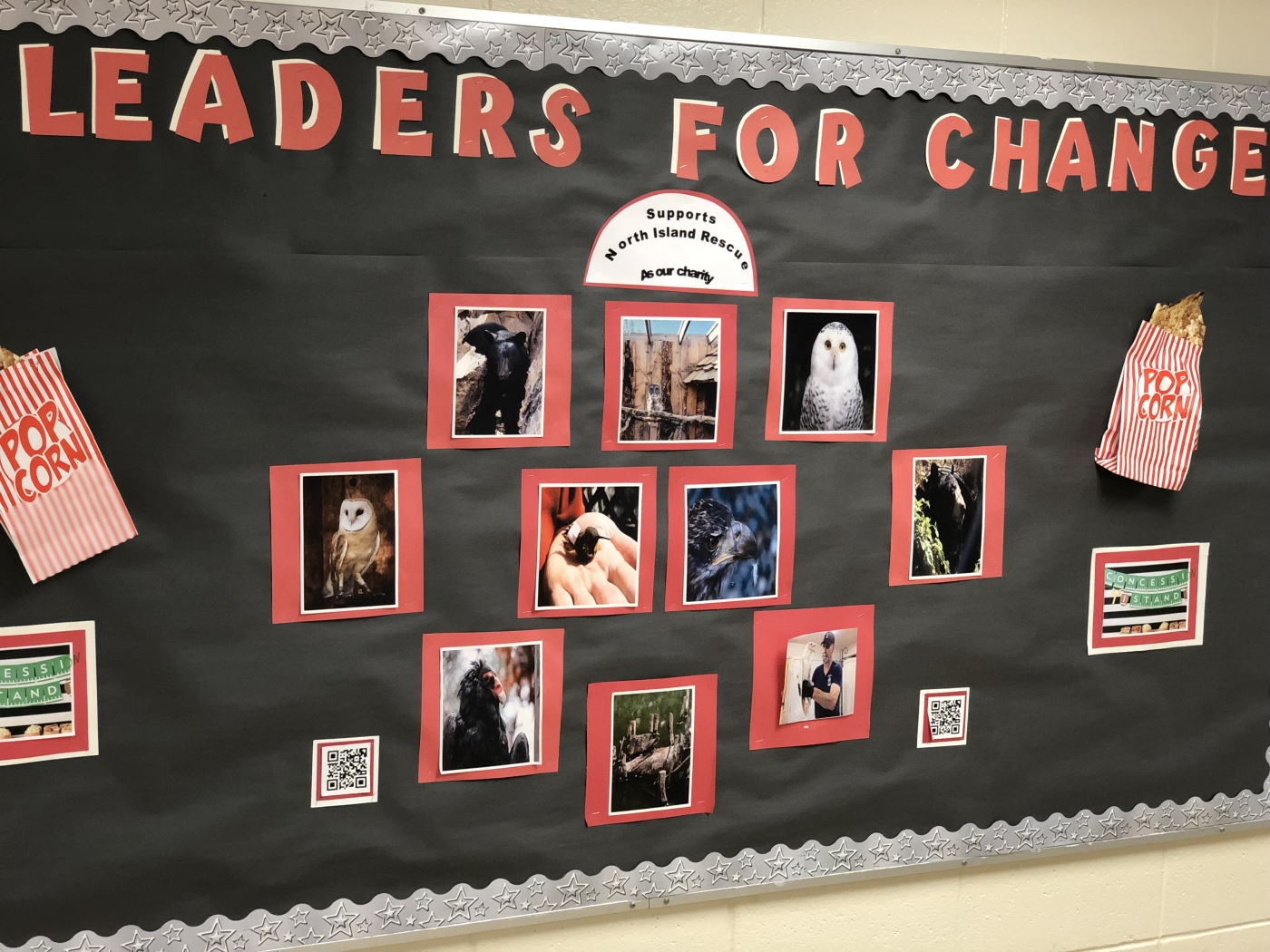
OUR NEXT STEPS
In the focus area of Social Awareness, students demonstrated growth in;
- Identifying diverse social norms, including unjust ones
- Taking others’ perspectives
Identifying diverse social norms, including unjust ones
Students in our intermediate cohort have spent the year learning about the unjust treatment of many communities of people in Canada and the rest of the world. Instruction was designed to coincide with the calendar of important times of the year that recognize various social groups and their historical significance. We analyzed the unjust treatment of Canada’s Indigenous Peoples, Black Canadians, Sikh Canadians and LGBTQ+ people and compared that to the values of inclusion and equity that we embrace at our school. We learned about these groups through story, various electronic media and guest speakers.
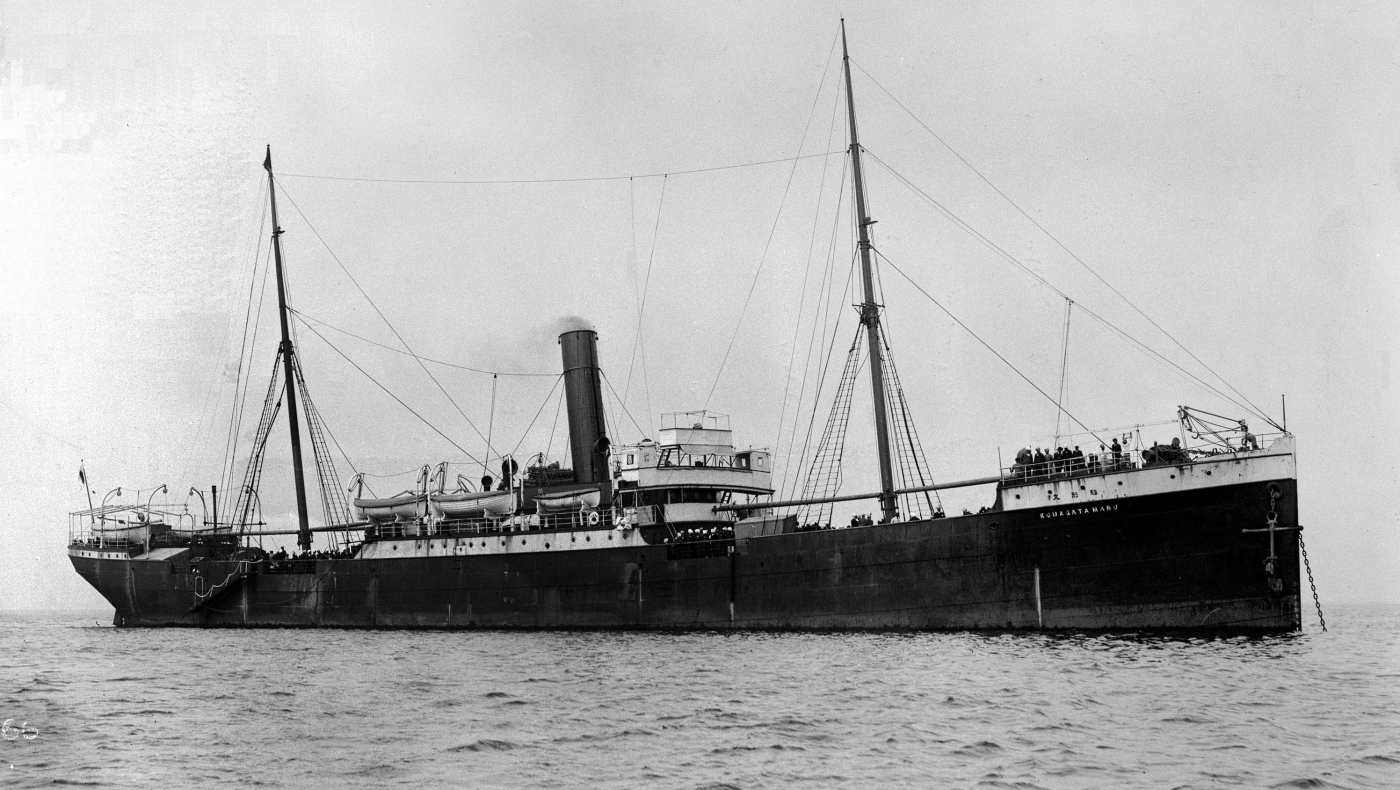 | 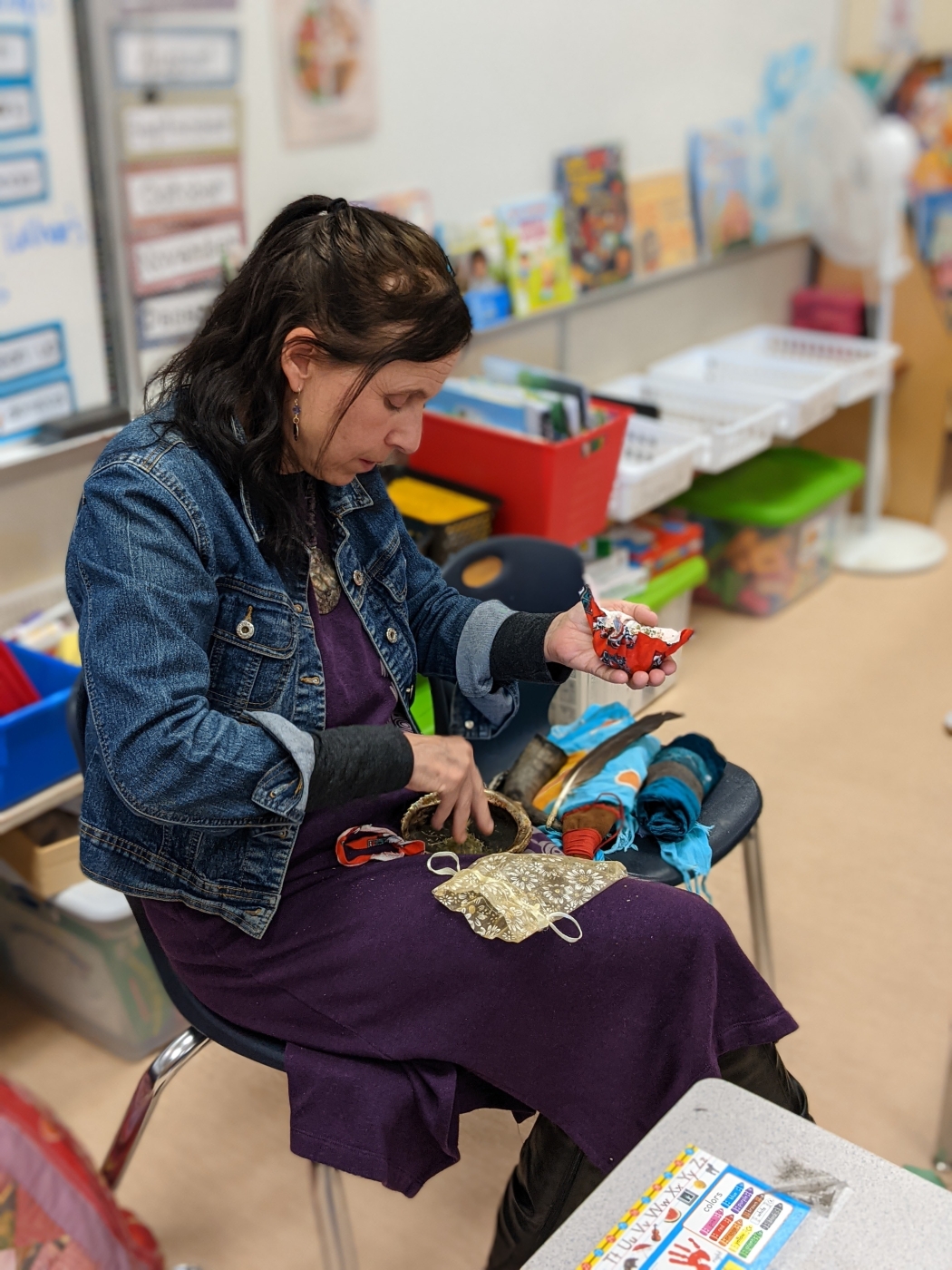 | 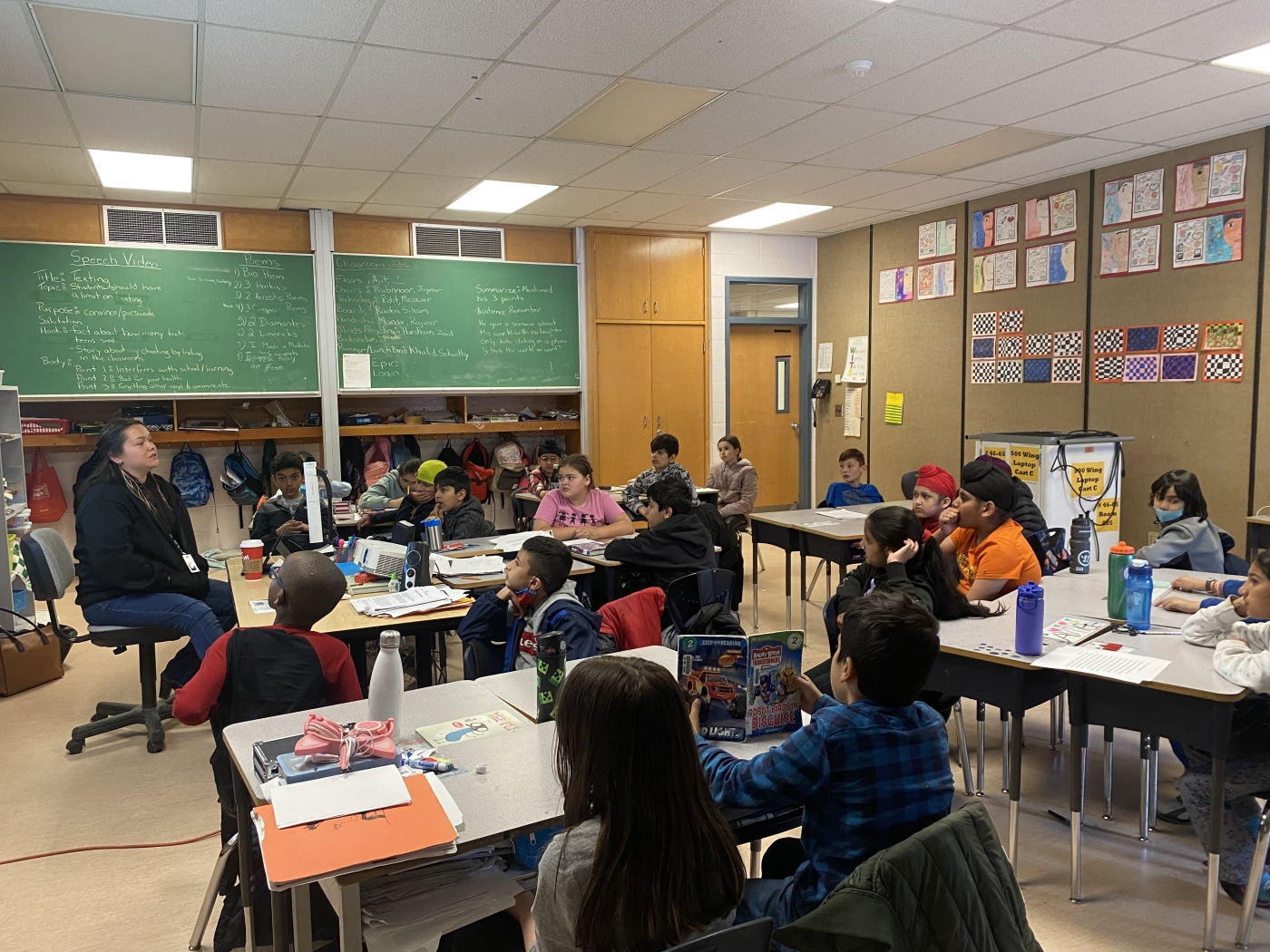 | 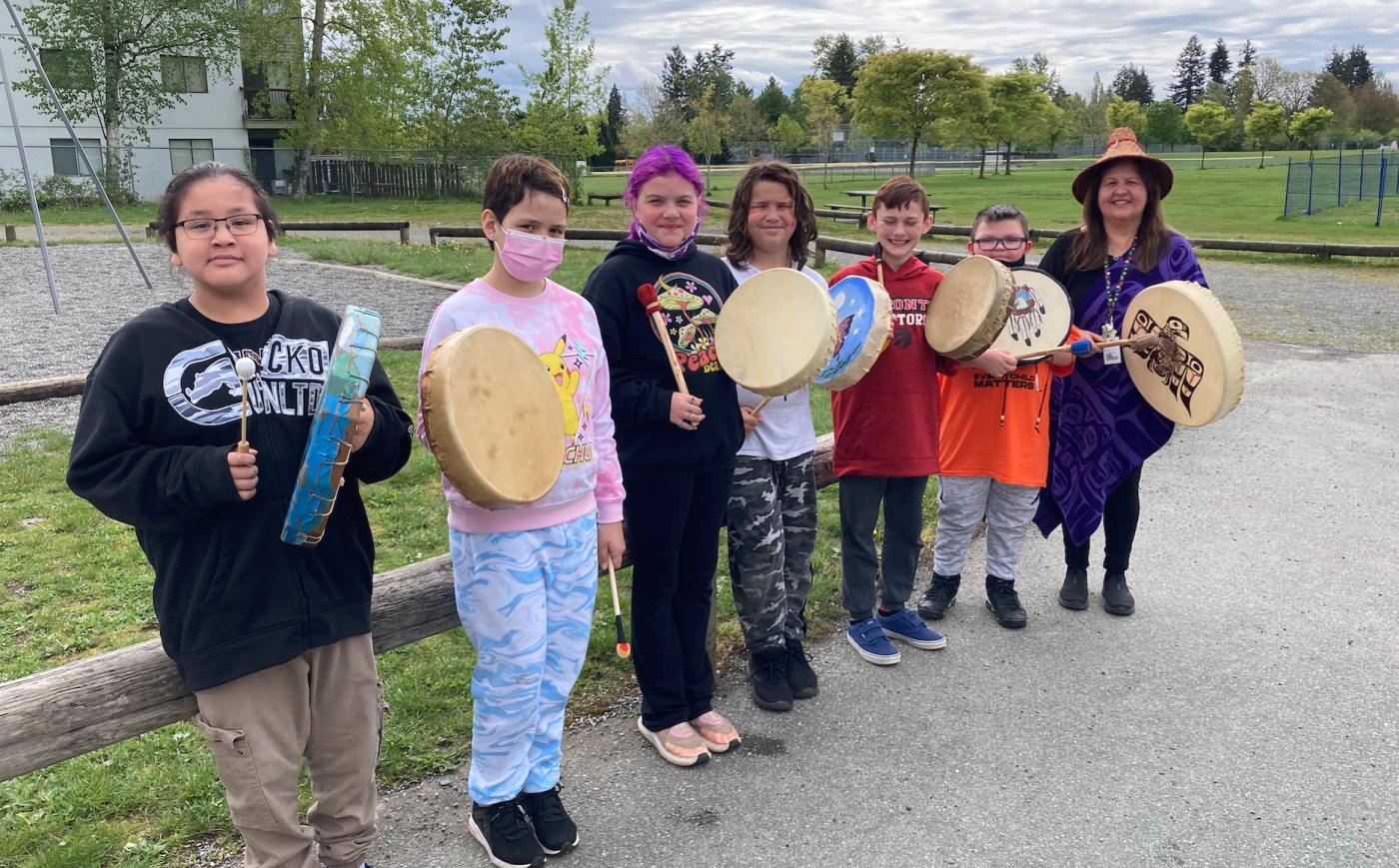 |
| KOMAGATA MARU | FIRST PEOPLES IN RESIDENCE WEEK | RESIDENTIAL SCHOOLS WORKSHOP | INDIGENOUS DRUMMING |
When asked to reflect on their learning, over half of the cohort (nearly 60% of students) were able to demonstrate a clear understanding of historical injustices and how learning about them is crucial for the building a more just and inclusive world. Students had this to say;
“When learning about the Komagata Maru, I discovered how unfair the law was that was put into place to stop Sikh’s from immigrating into Canada. I can understand this pain as a Sikh. Learning about this makes me feel the same discrimination that those Sikh’s also felt.”
“Black Canadians have been treated lower than white skinned people, despite being the same type of human being. I can imagine it would be horrible to be treated in an ugly way for something that they cannot change.”
“It is so unfair that that some cops are supposed to protect people but instead they are accusing and being racist to black people. Lots of black kids have lost their parents or family members to racism. It is so sad because you cannot control your skin colour or how you were born.”
“When First Nations were taken to Residential Schools, they were treated really badly. When the kids would speak in their own languages they would get punished. This was unfair and unjust.”
When contrasting these unjust norms with the values upheld at our school, student remarked that;
“Here everyone is welcome no matter what their skin colour is.”
“Our school thrives to make sure everyone feels safe and secure.”
“WE Kinvig represents honesty, caring and leadership as the school motto. Our school honours equity and fairness.”
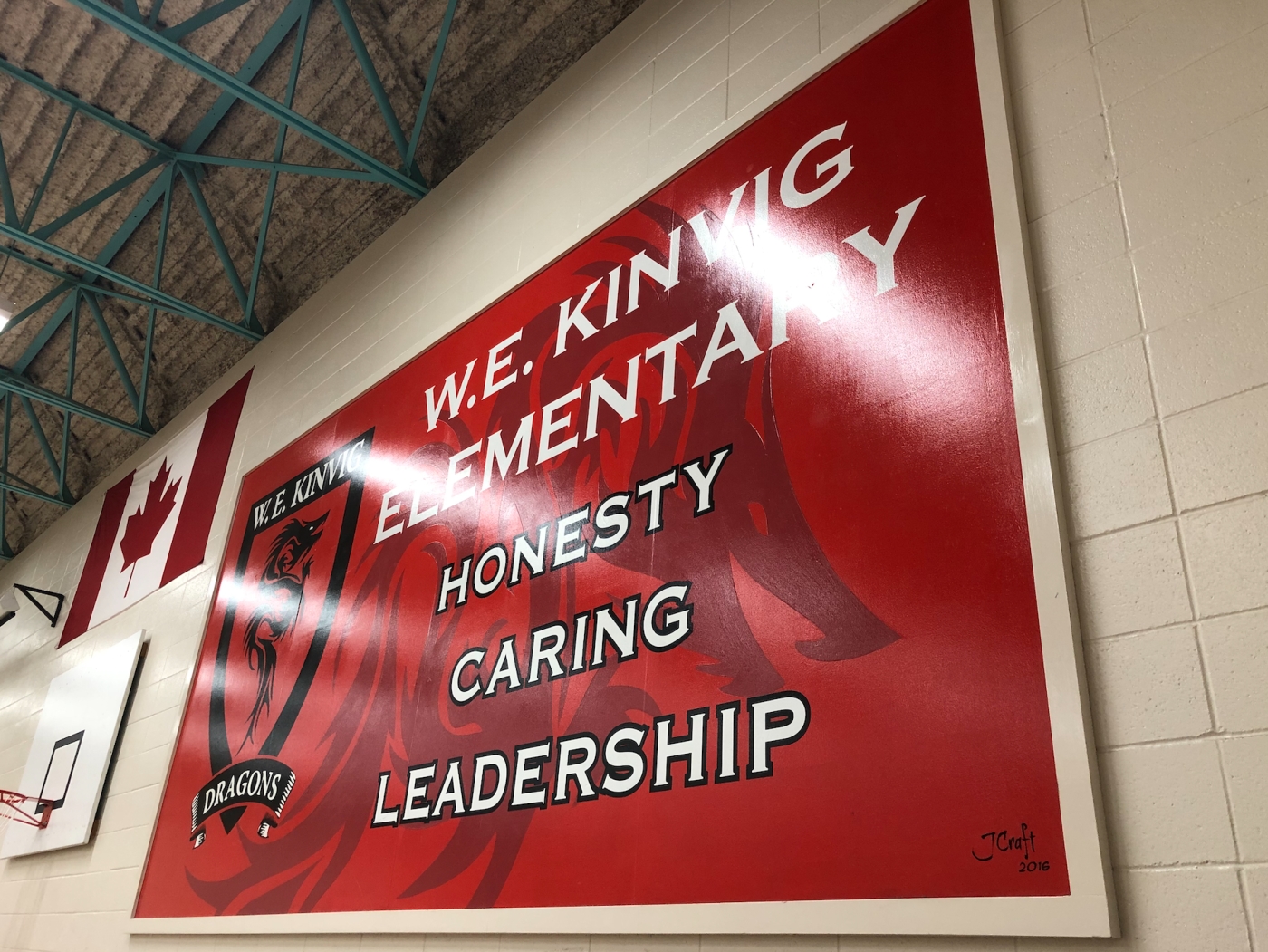
Taking others' perspectives
Our leadership students are learning about issues that impact their community. Early in the year, they settled on using their platform within the school to help animals in need. They partnered with the North Island Wildlife Recovery Center and devoted much of their time during meetings and special events to support the work this organization. Throughout the school year they created a variety of texts (stories, posters, articles) and shared them with the school through digital assemblies and during morning announcements. Broadly speaking, this cohort of students has demonstrated growth and a proficiency in taking the perspective of others (in this case, the perspective of wild animals) throughout the school year with just over 70% communicating this during our weekly meetings and in their writing activities.
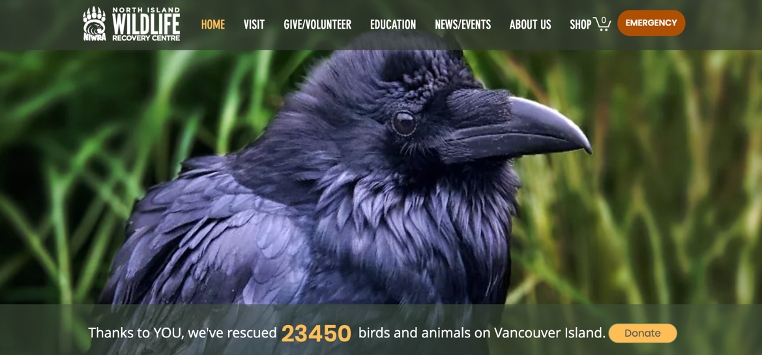
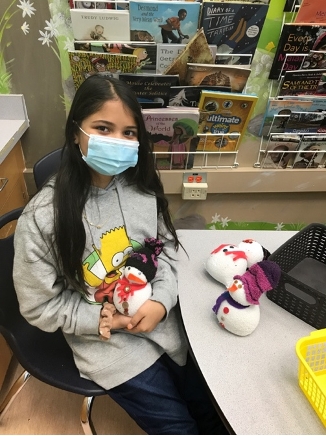 | 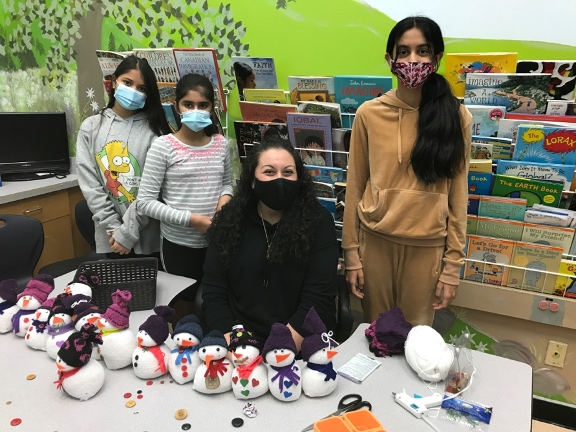 |
Below is an excerpt from an interview with one of our leadership students reflecting on the work they have done this year;
It was important for the leadership team to raise awareness for wildlife because saving animals is very important to us. Animals are living beings just like people are and they need things for survival just like humans do. It is not fair to animals to have their homes and their lives impacted by humans so it is only fair that we help them in any way that we can.
It makes me feel really good to be involved in the leadership activities because we are doing something that is helpful to animals. I am excited to work the team some more to think of some ideas to raise awareness to other important issues. Maybe next time we can help out in other ways. An idea I have would be to help children in need because it is not fair that so many children don’t have homes or a family.
It really makes me feel proud to do this type of work at our school.
In the focus area of Responsible Decision-Making, students demonstrated growth in;
- the understanding of their personal decision making in promoting community/environmental wellbeing;
Our early primary cohort has engaged in several learning activities that highlighted the importance of the power individuals have to make a collective environmental impact. Students wrote reflections and shared their learning in small groups and in conferences with their classroom teacher. Our focus was primarily on local water conservation efforts and how access to clean drinking water varies greatly throughout our world. This learning objective was explored through picture books and various online media.
By the time Earth Day came, the students were ready for their own walk for water. Our plan was to walk once around the school to try and imagine what it must be like for our heroic character in Susan Verde’s The Water Princess to have to walk such a great distance for something we have access to within mere steps.
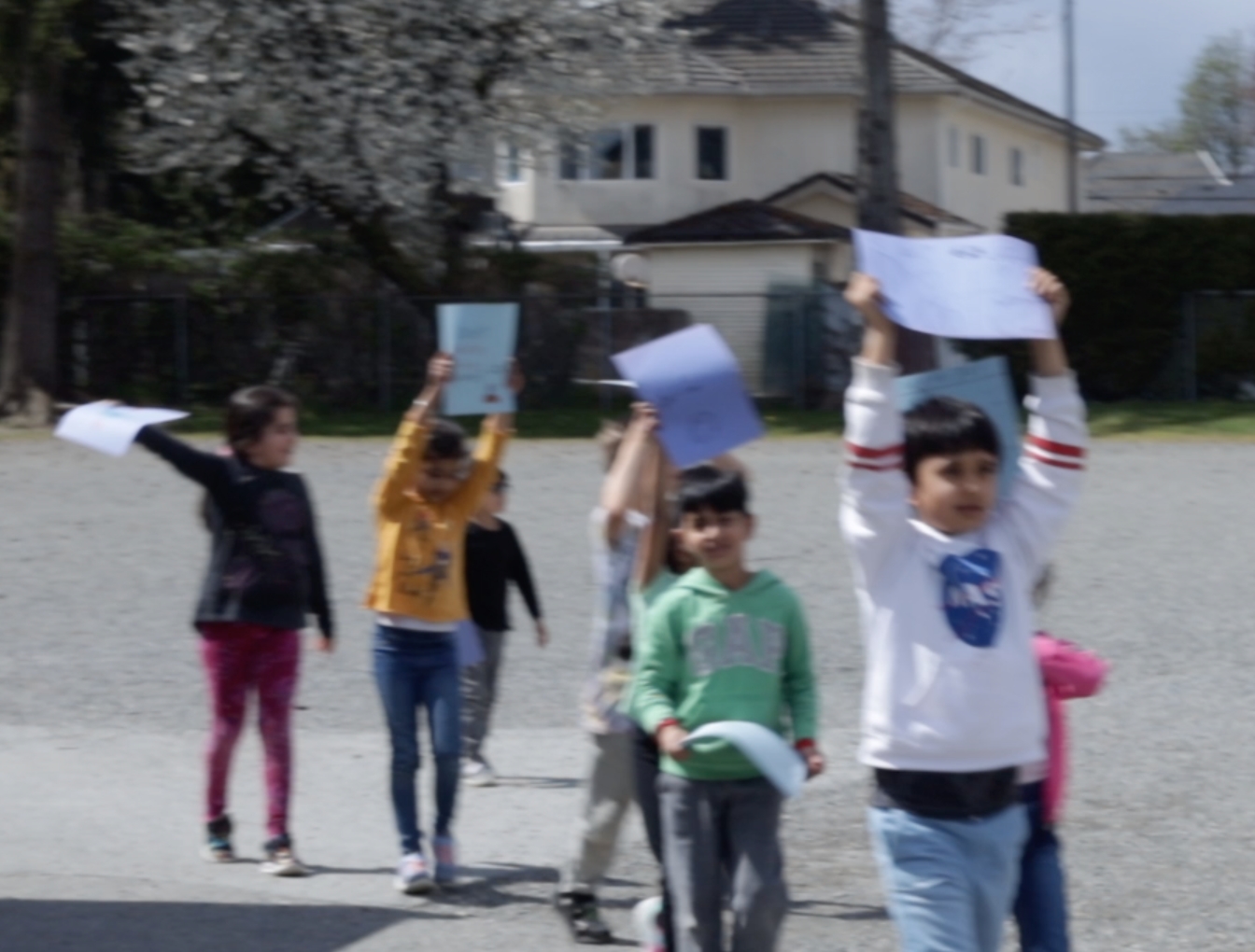 | 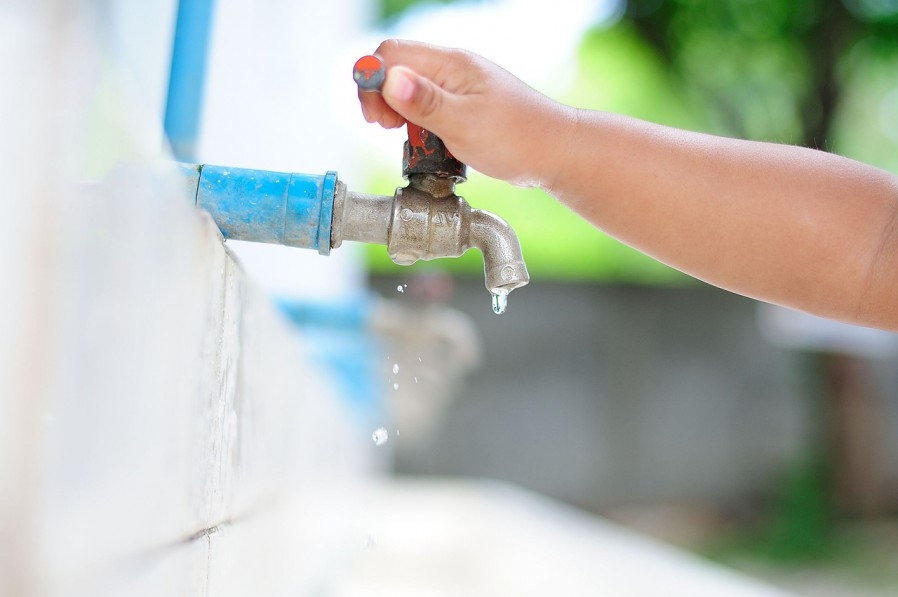 | 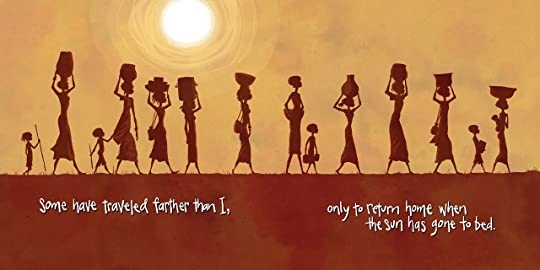 |
The entire cohort voted to extend their walk to communicate the importance of water to others in the school. It was a warm day and after one walk around the school, students saw the others from several classes playing on the field and playground. Despite the desire to join them and play, they persevered and continued their walk. Their message was more important to them. It brought up a great class decision regarding how one person can care so deeply to effect change and how this desire to do good can be contagious.
When asked to reflect later on their learning of how water is used in different communities, how we can be respectful of water, and how can we use it with care, nearly our entire cohort (just over 90%) were able to provide at least one reason as to why it was important to make responsible decisions surrounding the use of water and what they could do to contribute to using water responsibly. They demonstrated this through many different activities, including class decisions, small group decisions (such as a think, pair, share) as well as written reflections and conferencing. Here is a sample of what some of the students shared during a conferencing session earlier this Spring;
You cannot throw garbage in the lakes because it is not good for it
Do not throw garbage around because it will just stay in the water.
You shouldn’t waste water because it is important to us for survival.
You should not waste water by letting it run. You should turn the tap off!
The water is important to the Coast Salish for their culture and for the salmon.
MOVING FORWARD
We are proud of the accomplishments and growth that we have observed within our cohorts in the areas of Social Awareness and Responsible Decision-Making. As we look ahead to the future, our plan is to;
Social Awareness
- continue to provide school wide learning opportunities at many points throughout the year to promote social awareness on issues pertinent to the global community.
- incorporate Indigenous pedagogy and other SEL strategies into classrooms that are designed to foster connections and build relationships among peers.
Responsible Decision-Making
- continue to explore pertinent local and global environmental issues and how our individual actions have the power to make a difference for the future of our planet.
- use our school wide WITS (Walk Away, Ignore, Talk it Out, Seek Help) program as a means to resolve problems
- create more learning opportunities to explore an aspect of responsible-decision making that teaches us that actions have consequences - both positive and negative.
